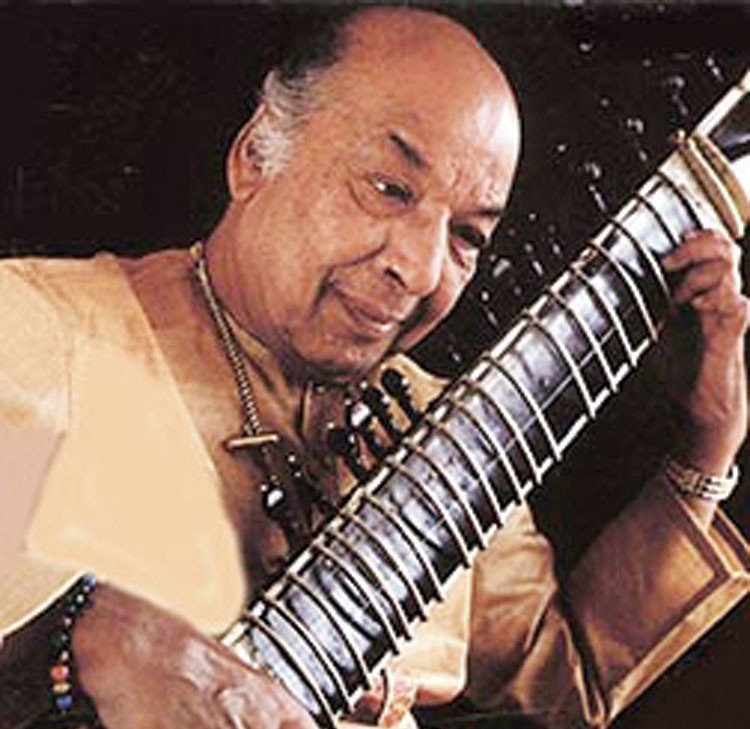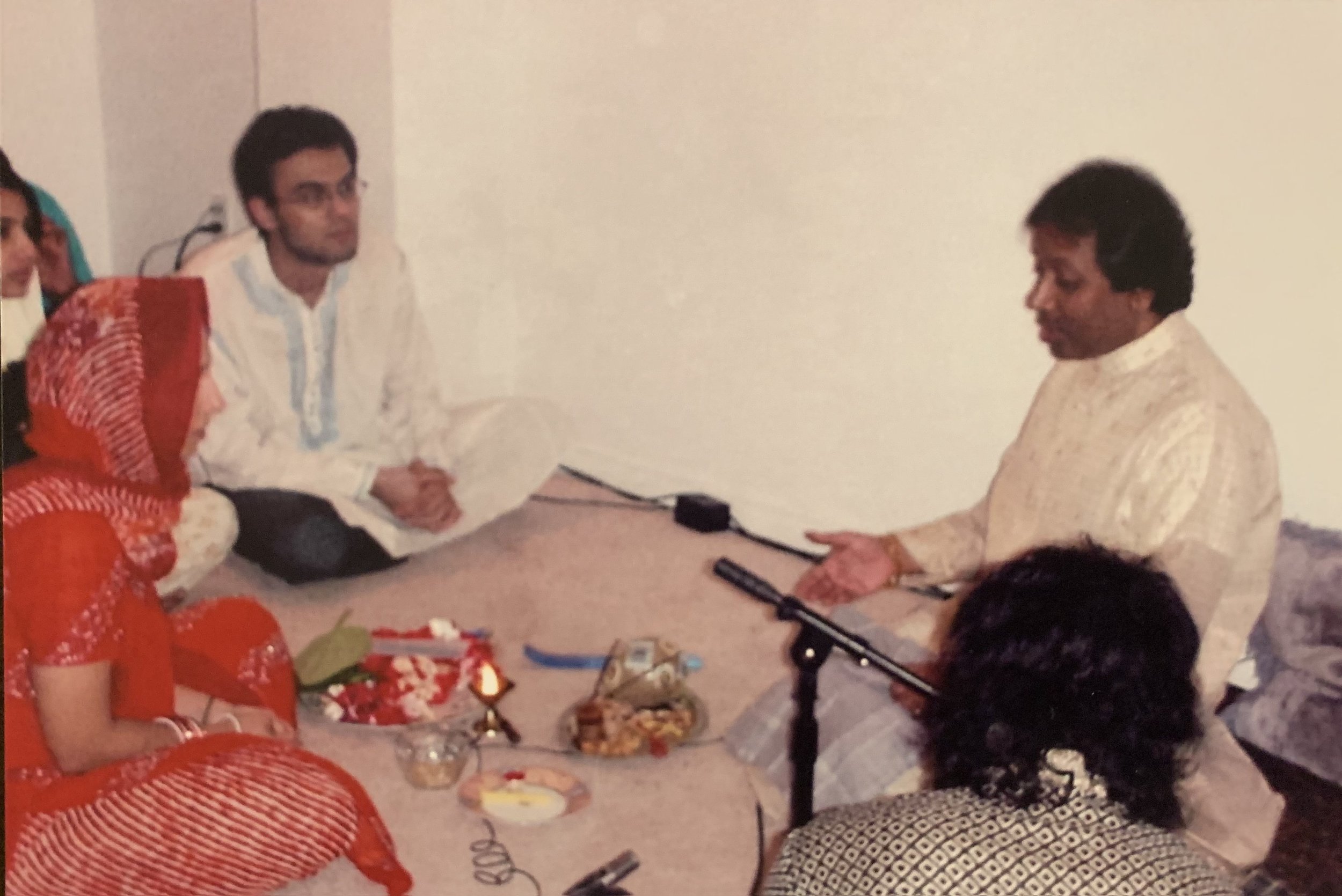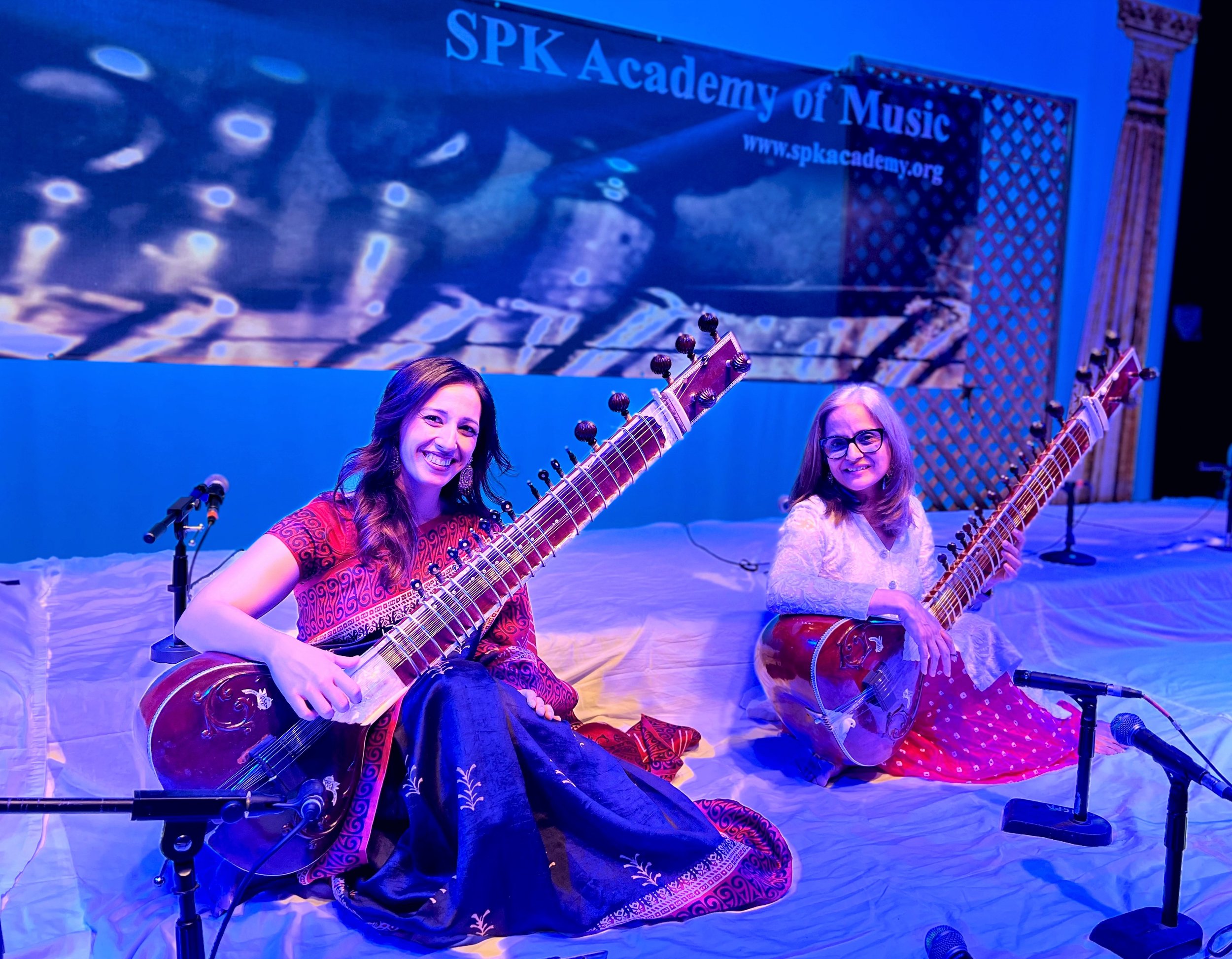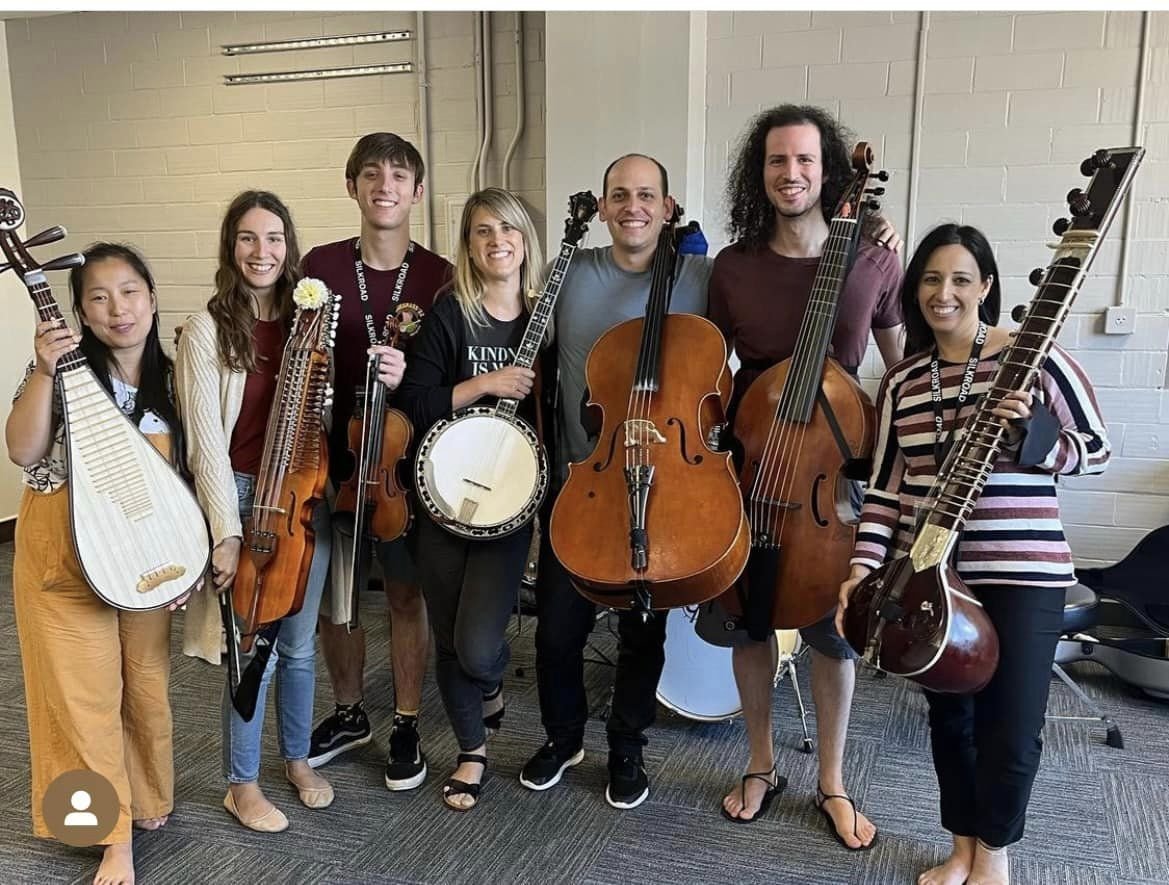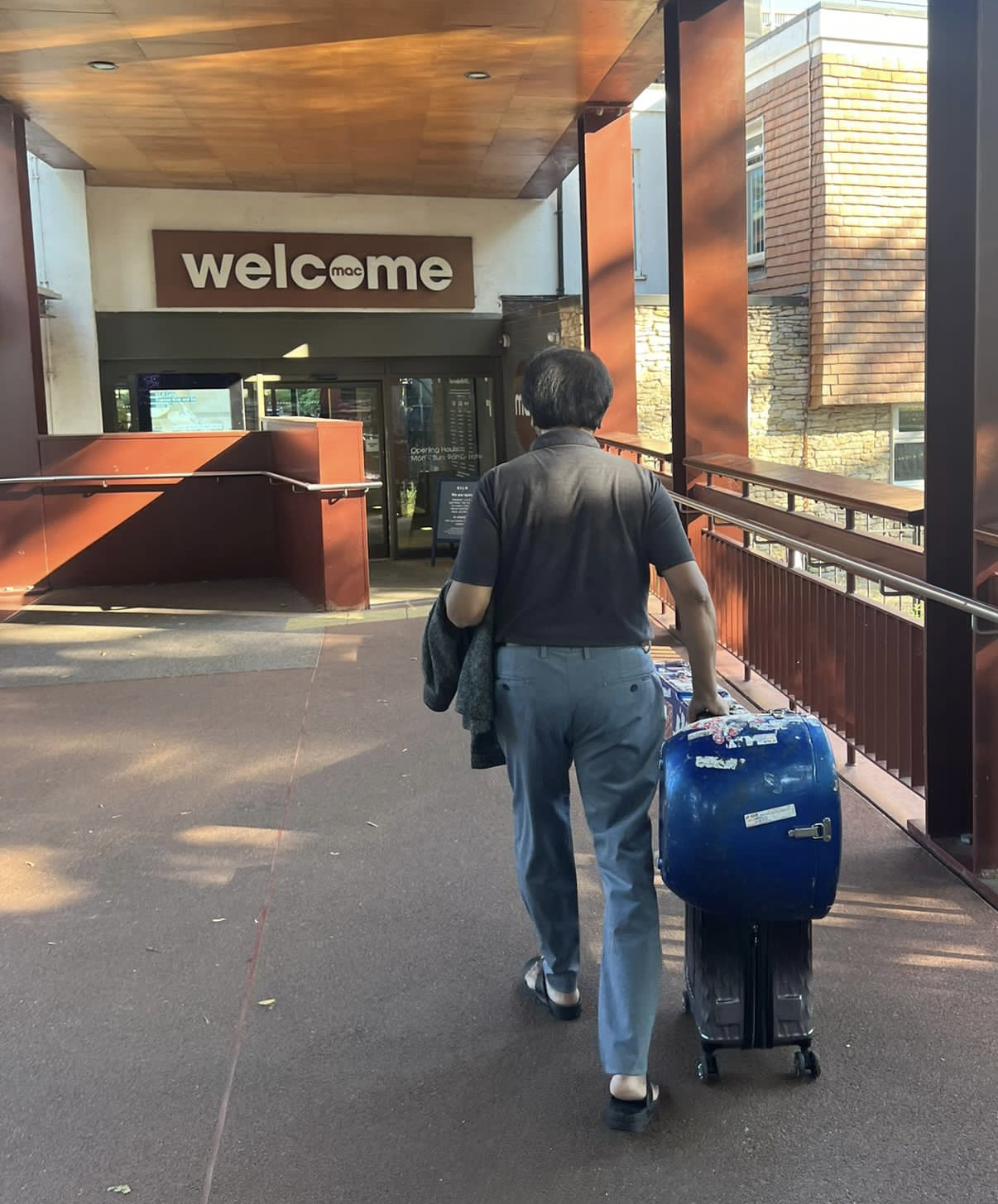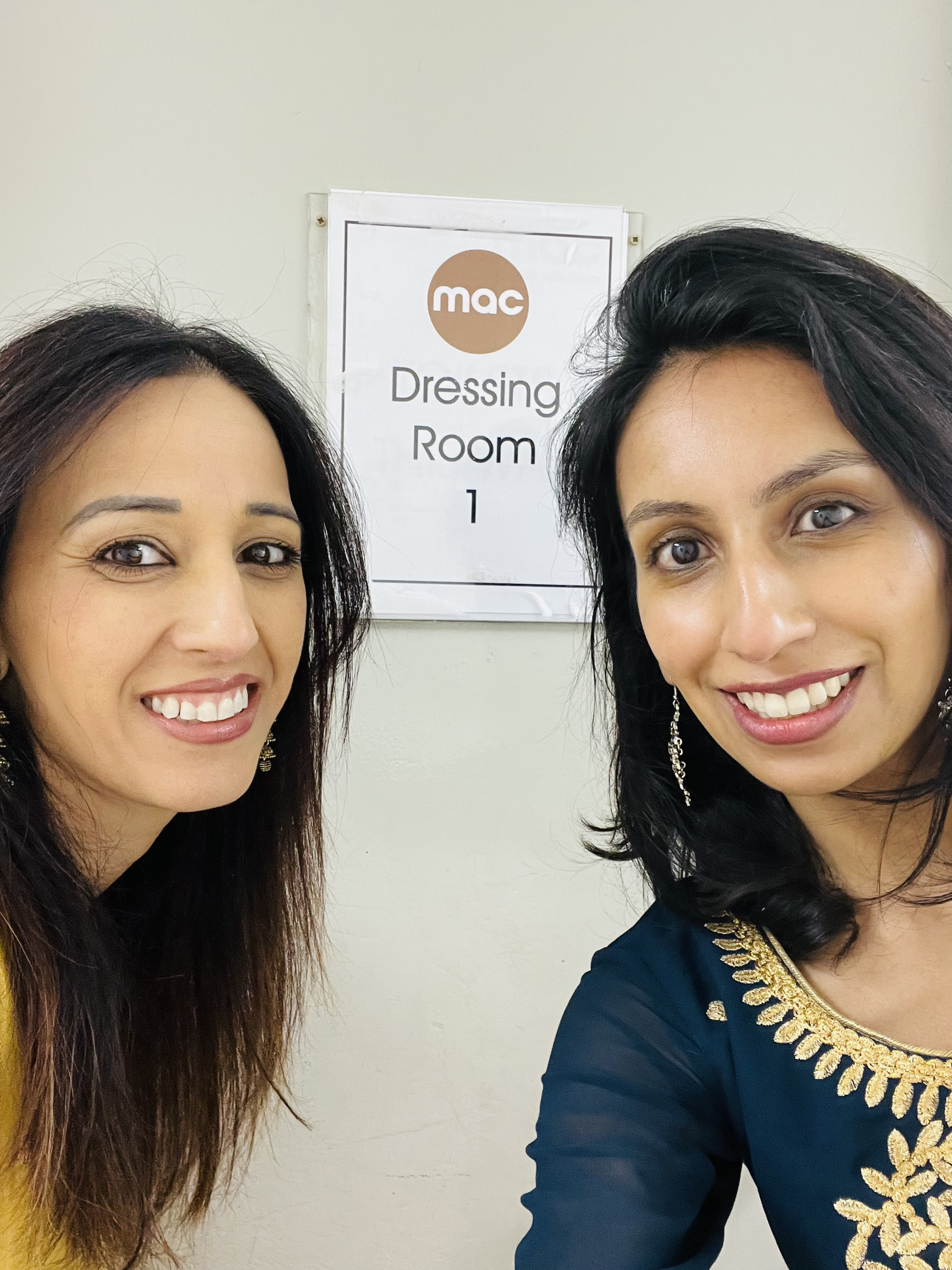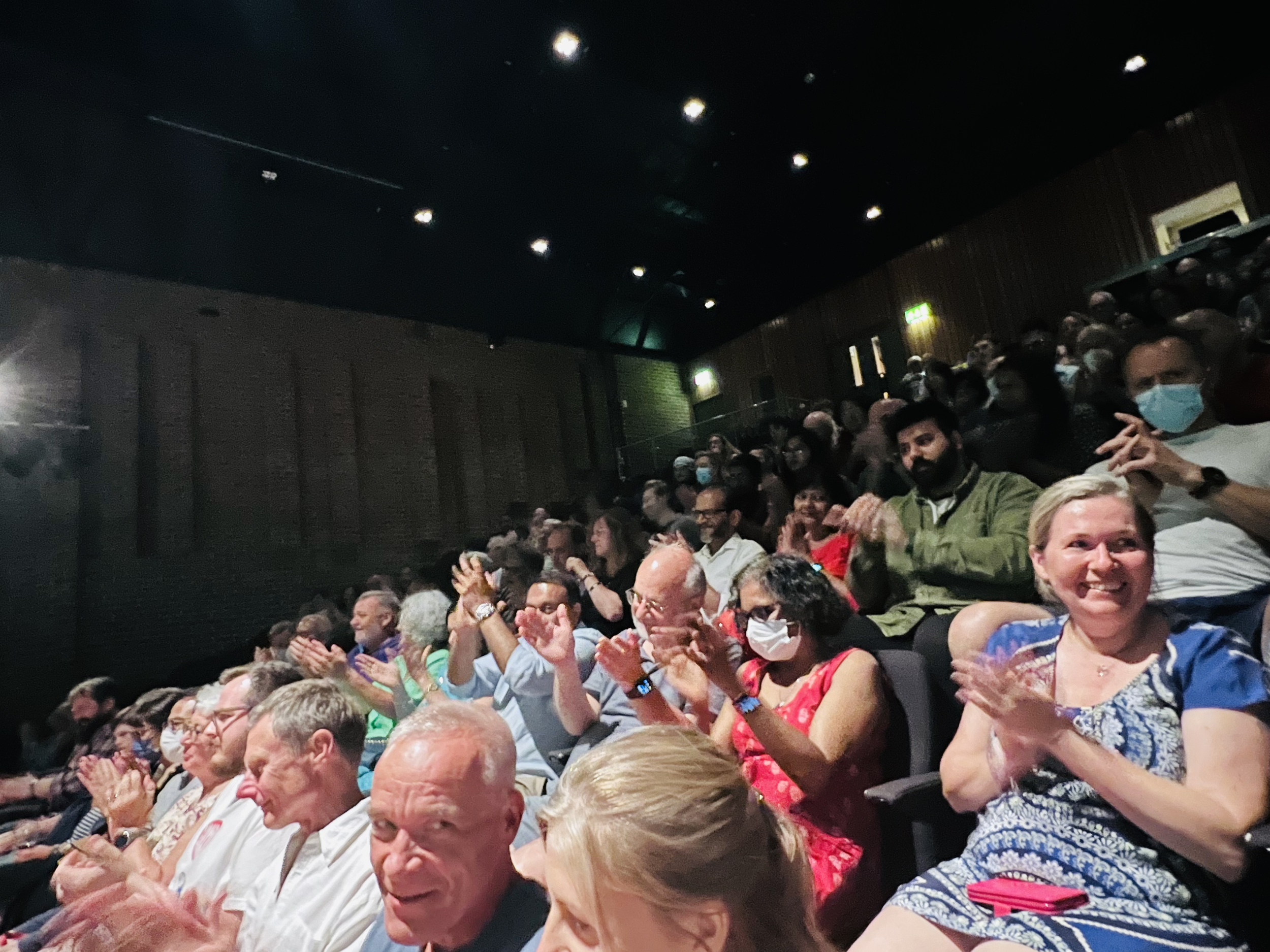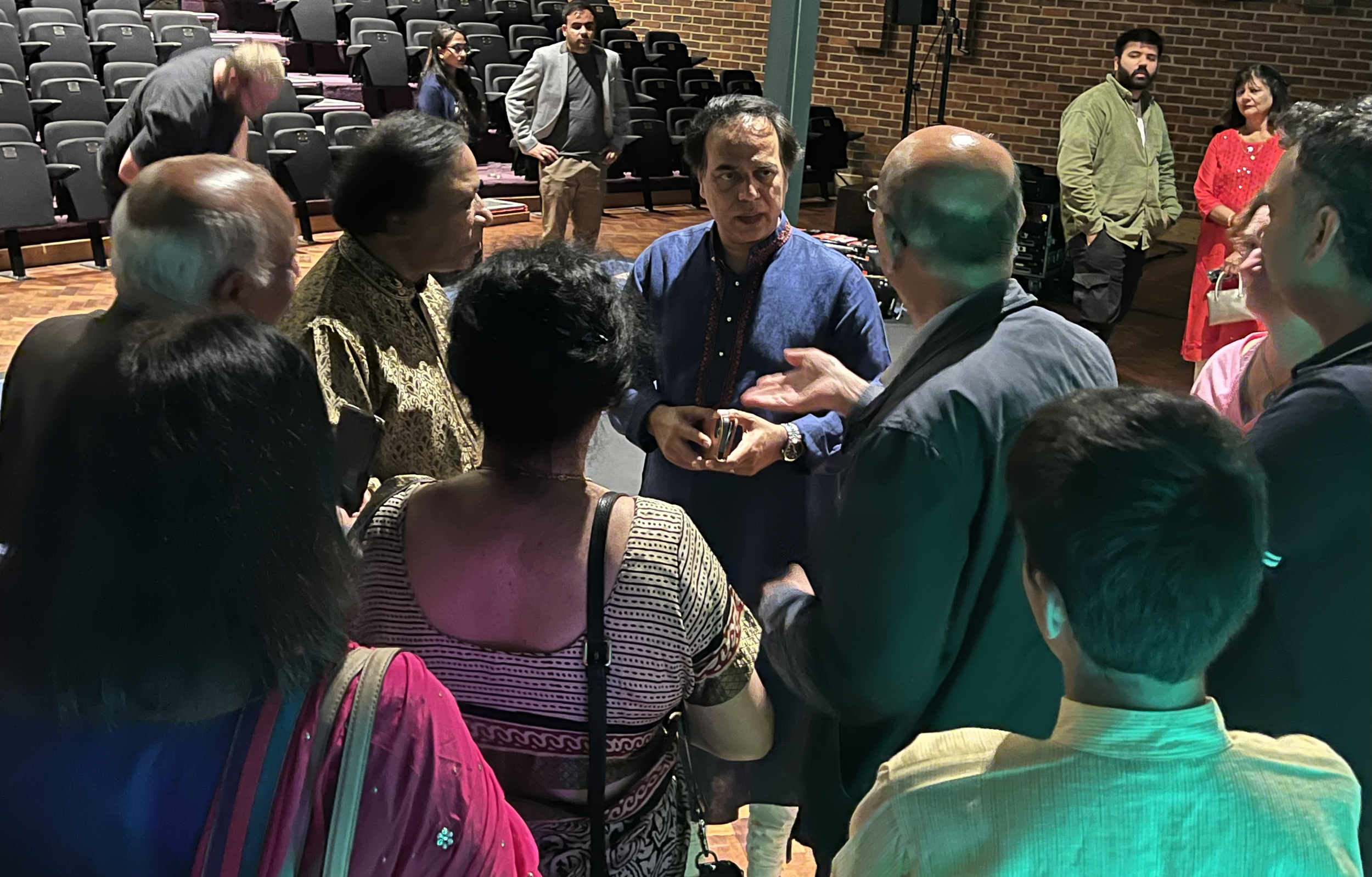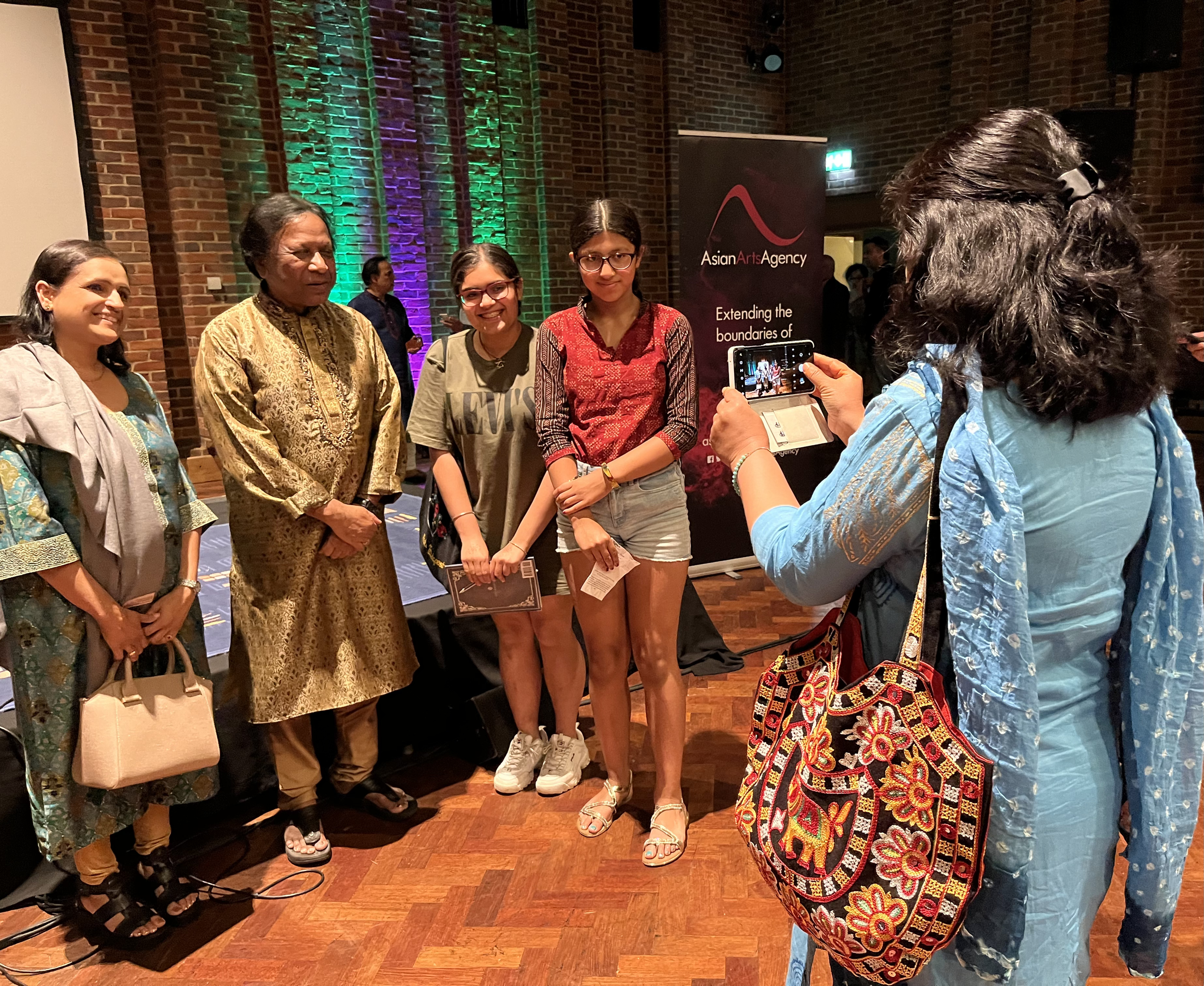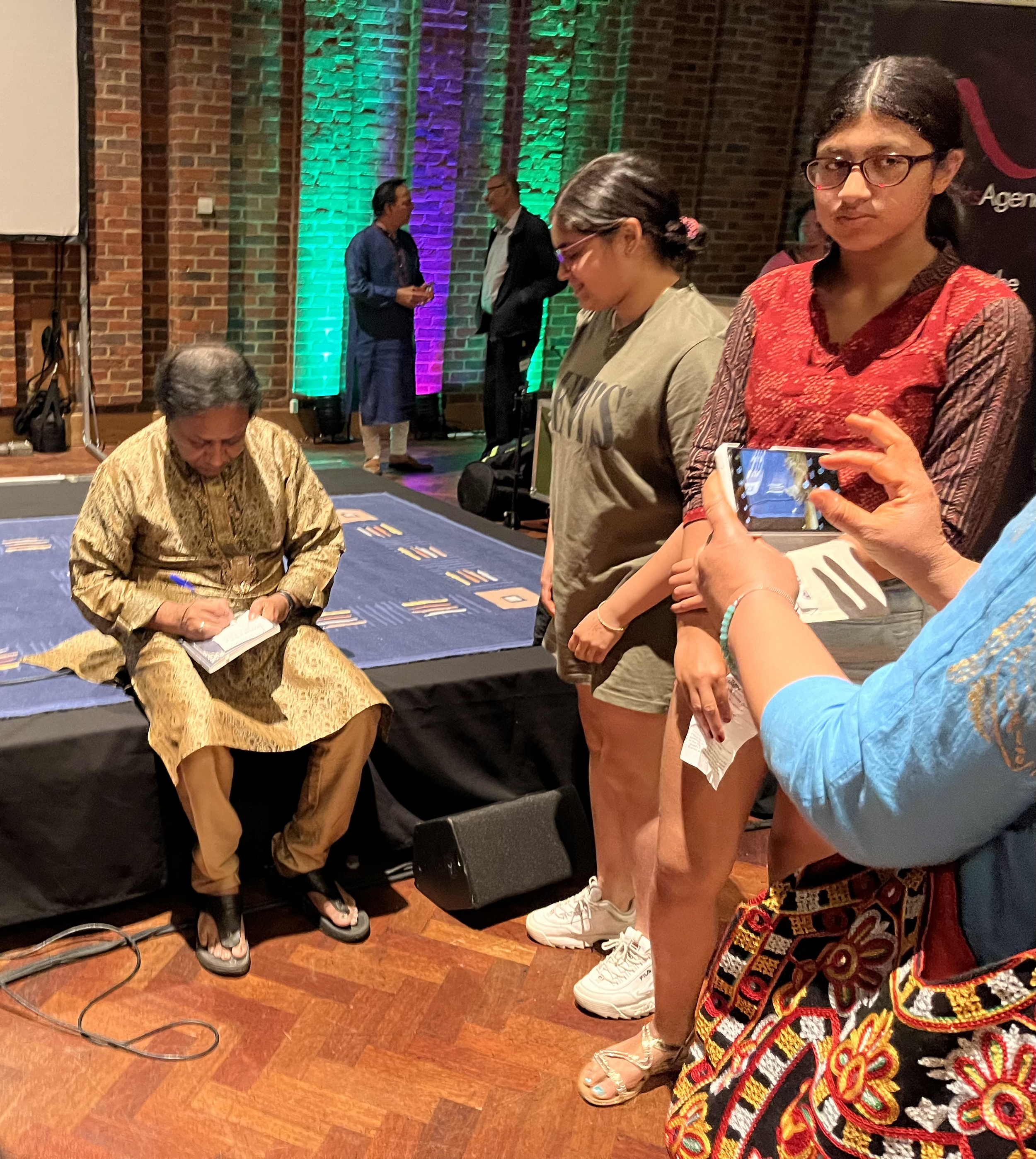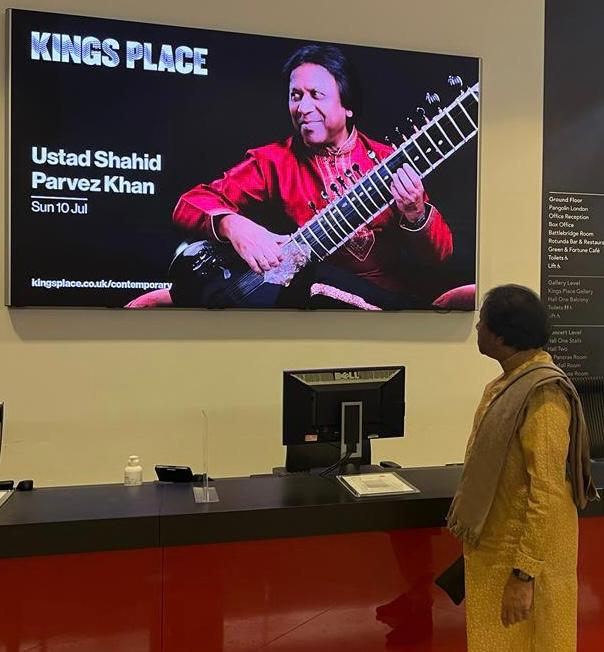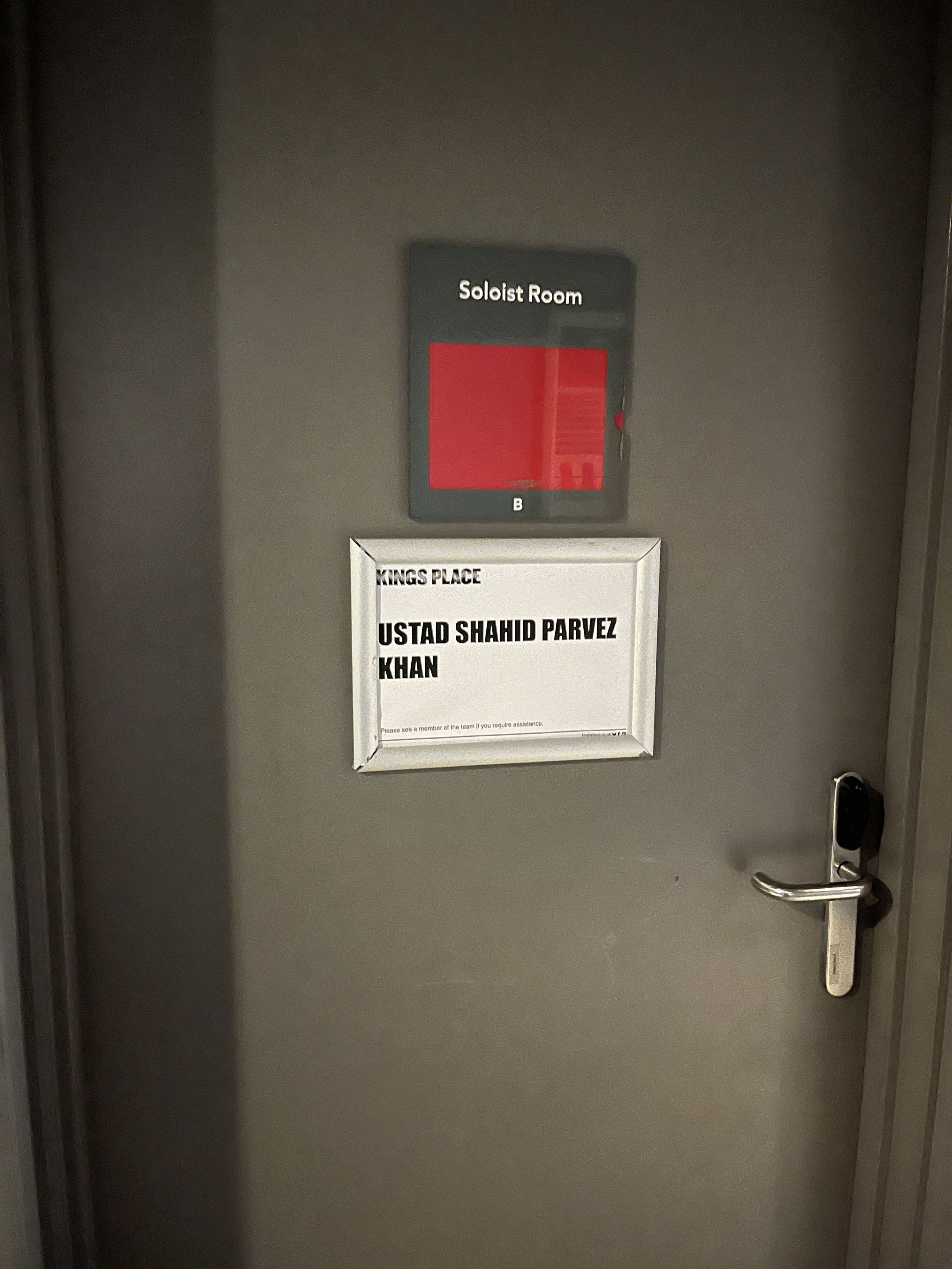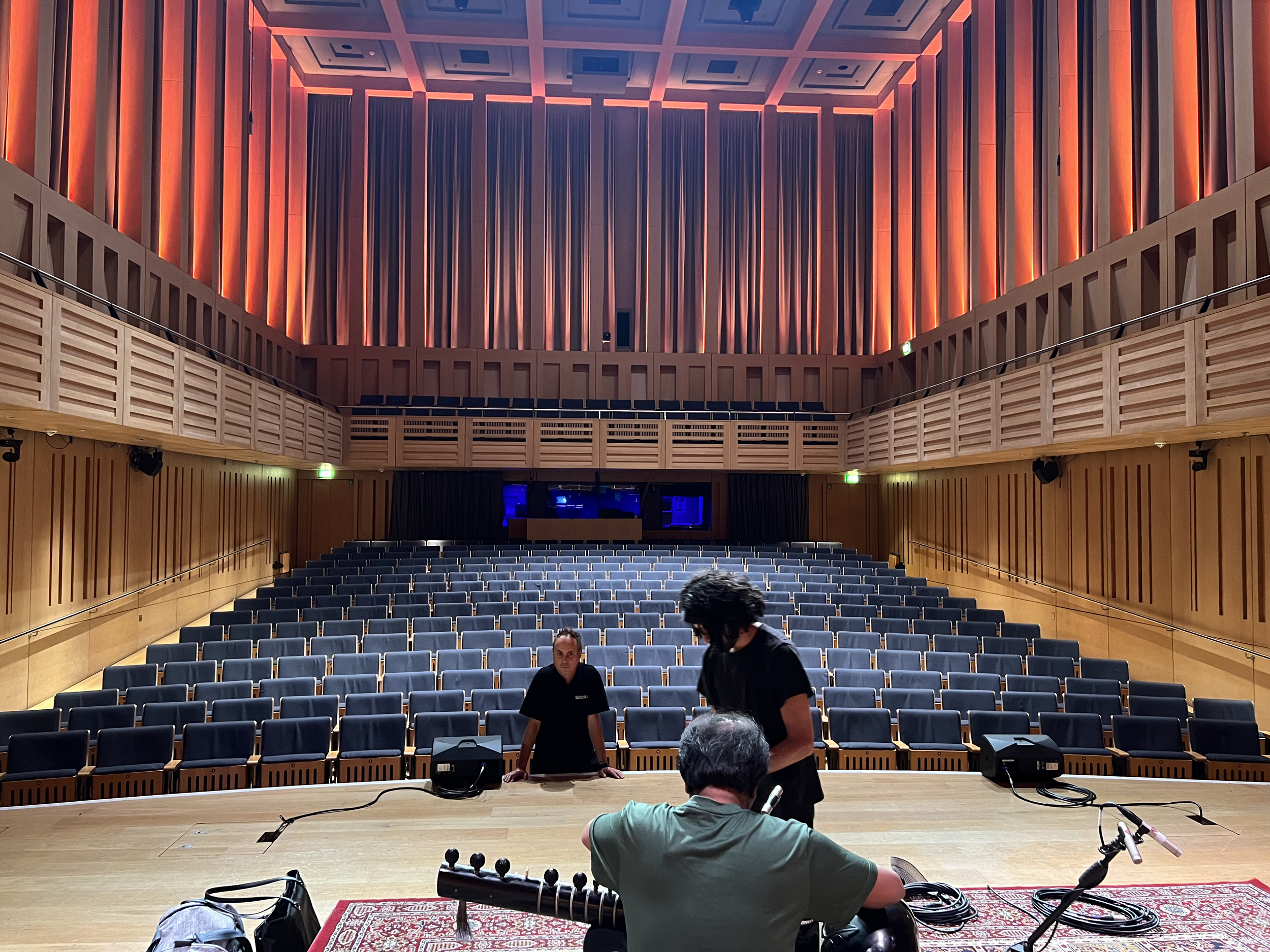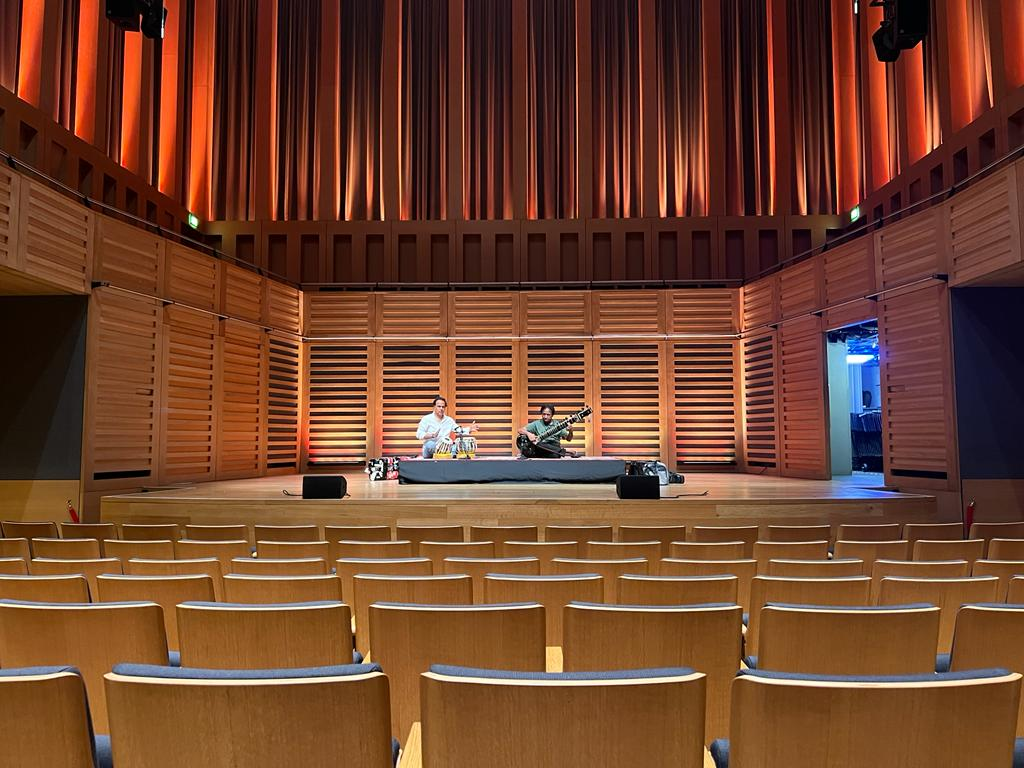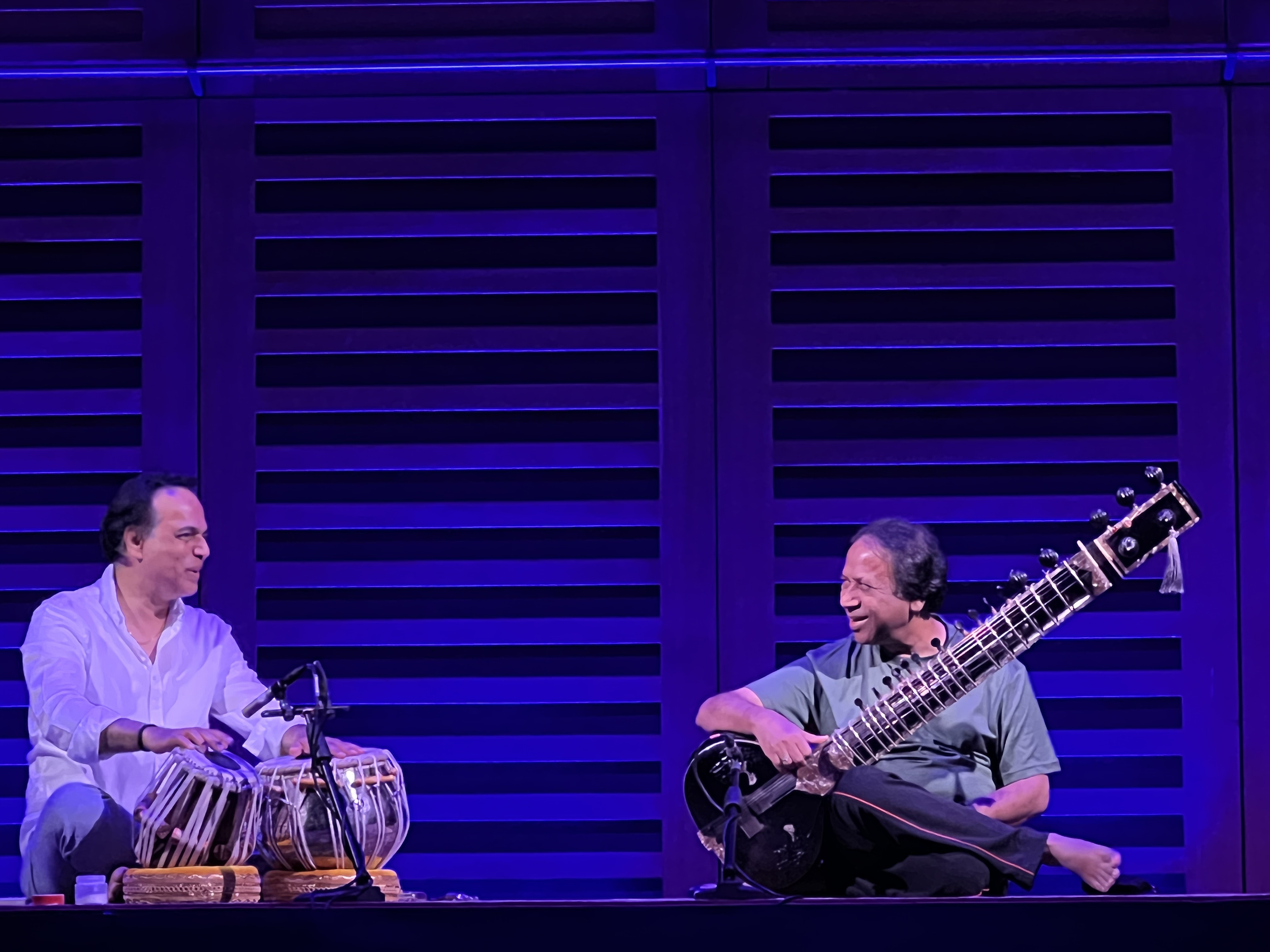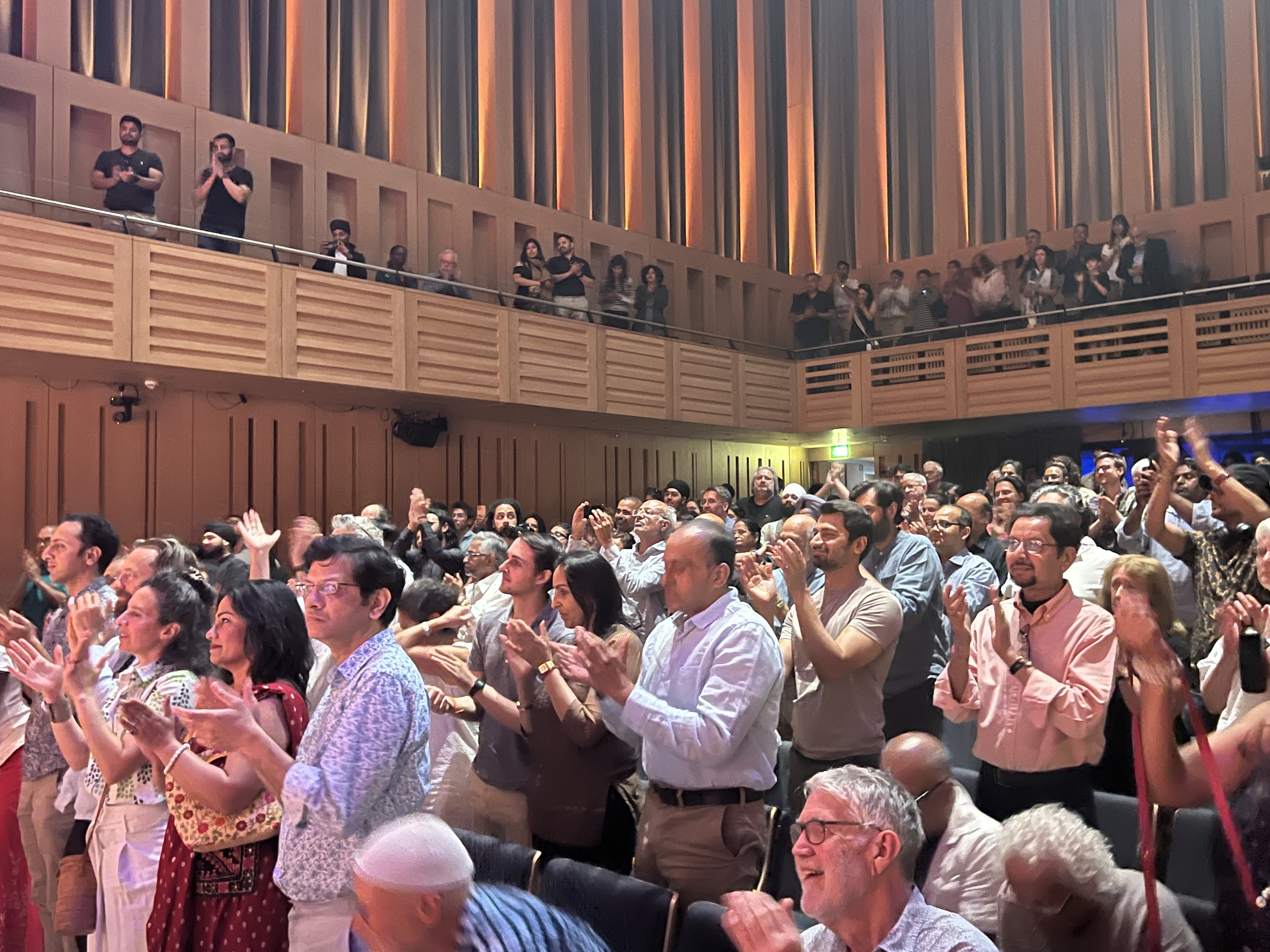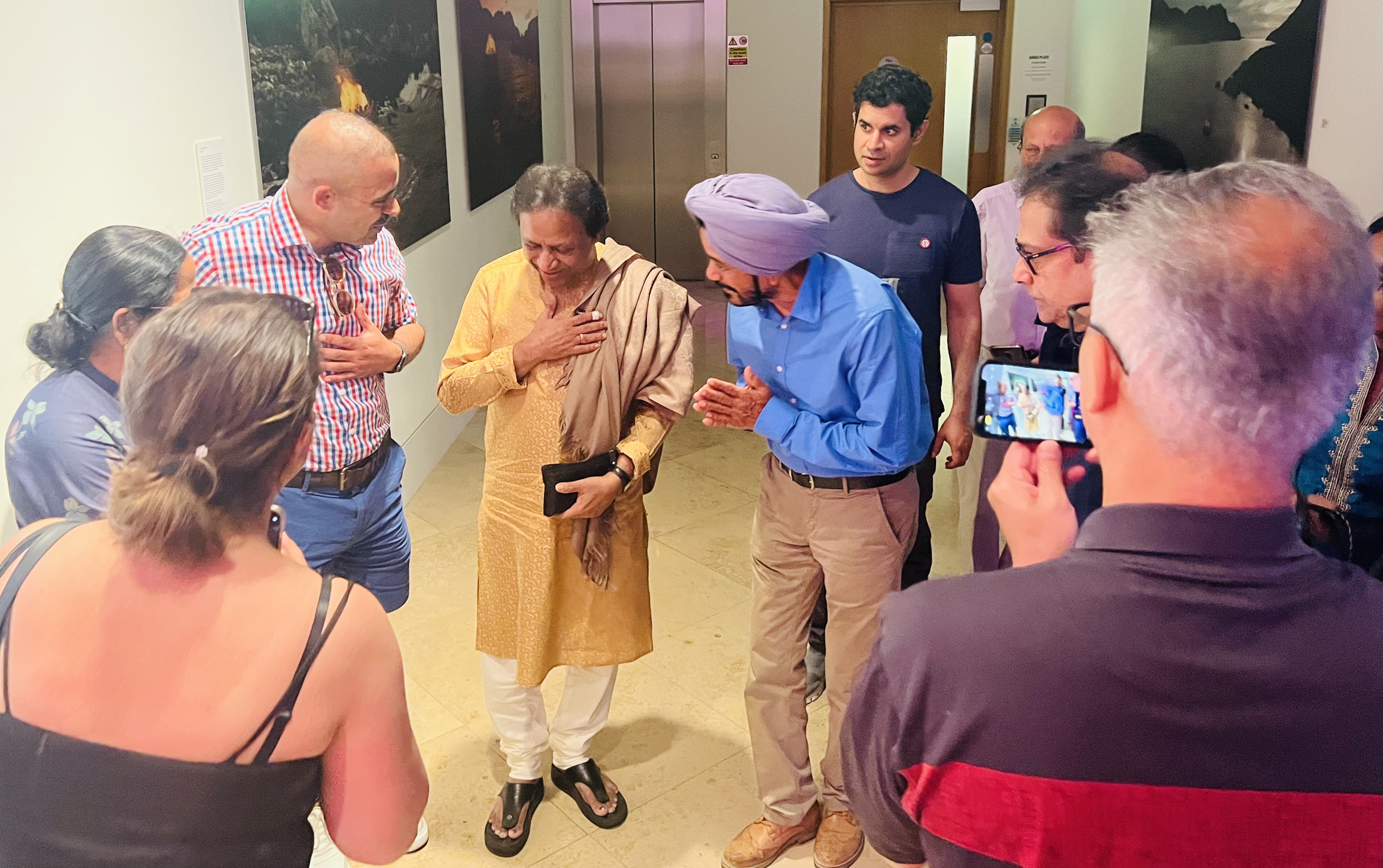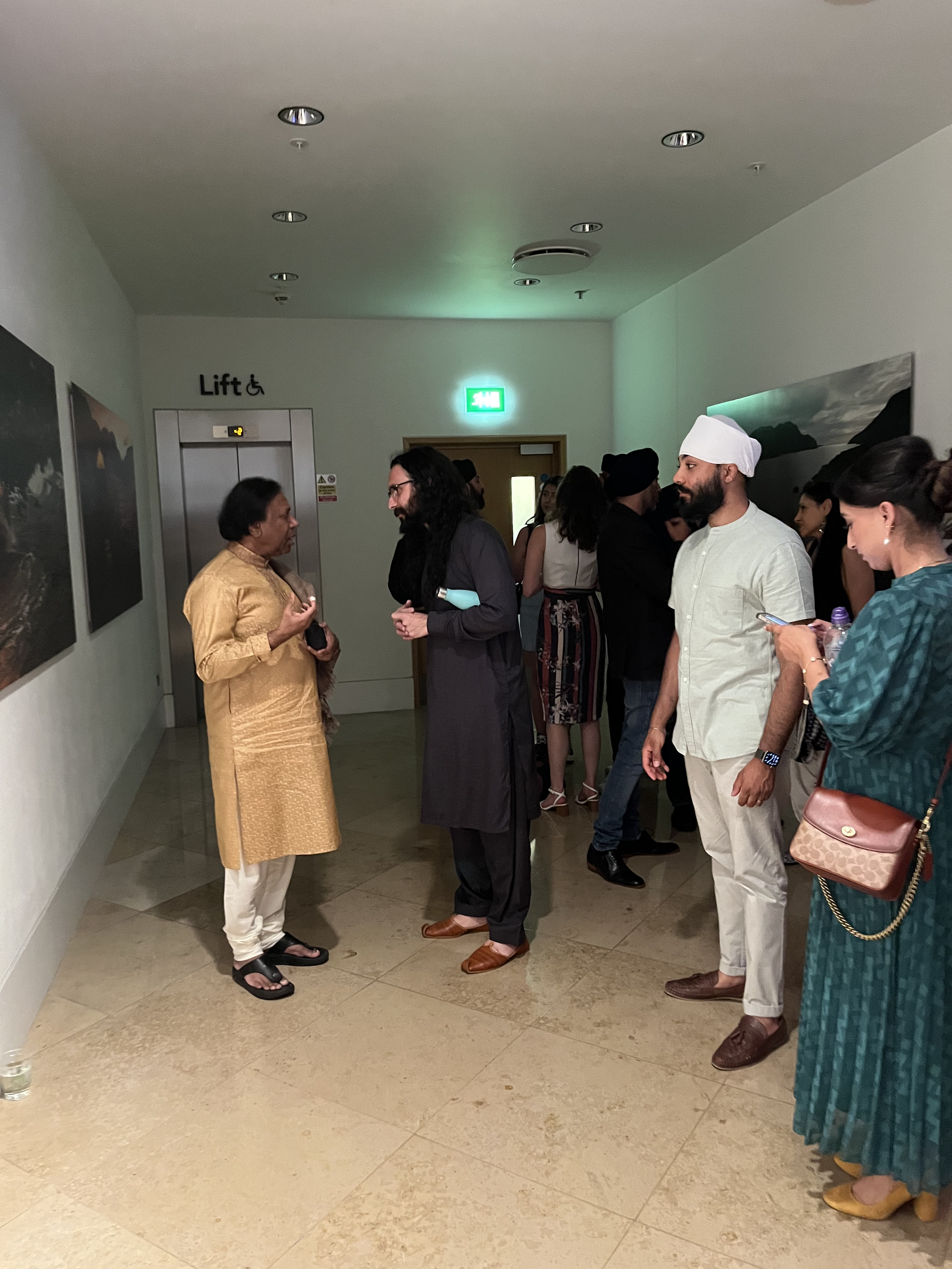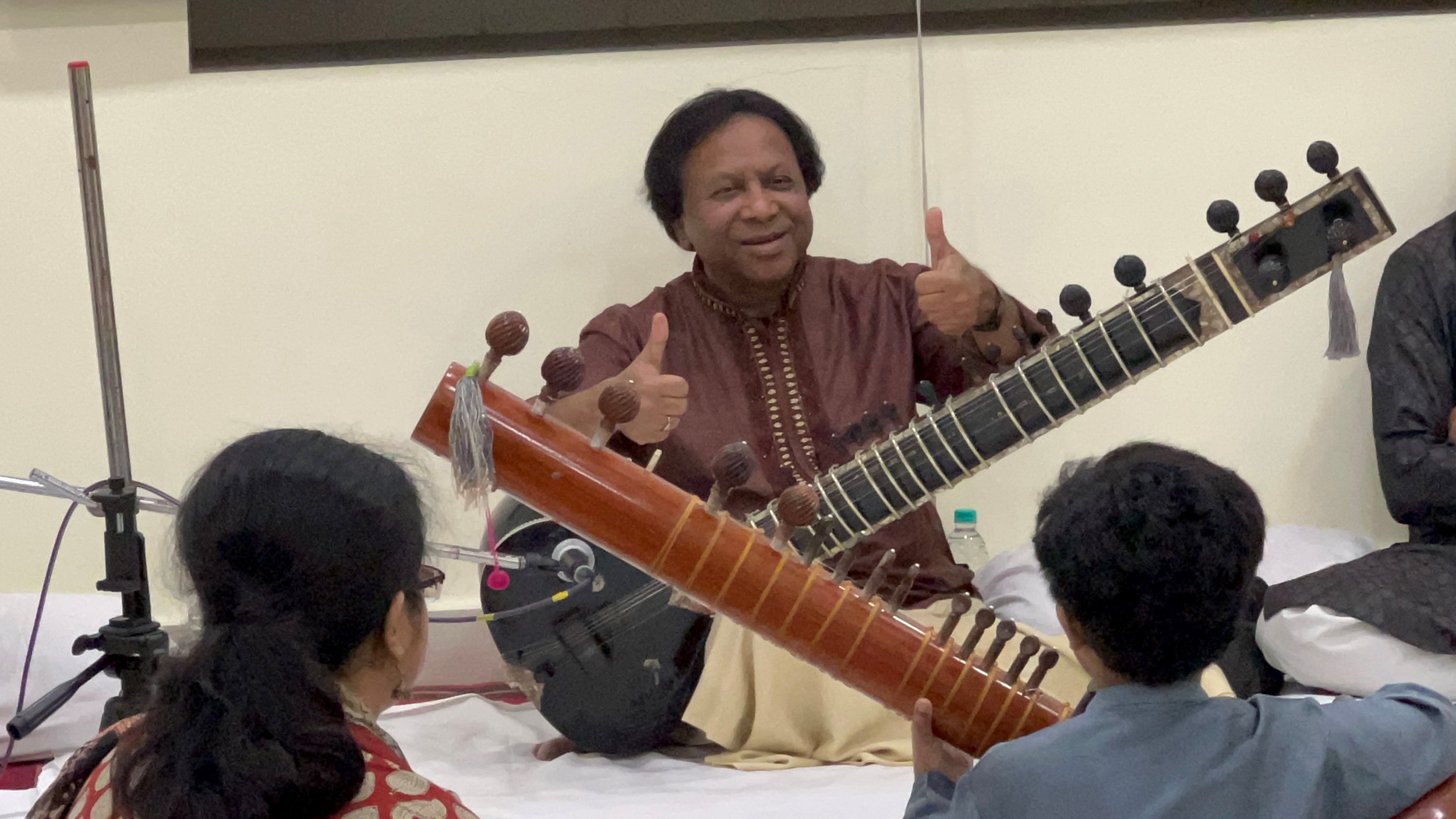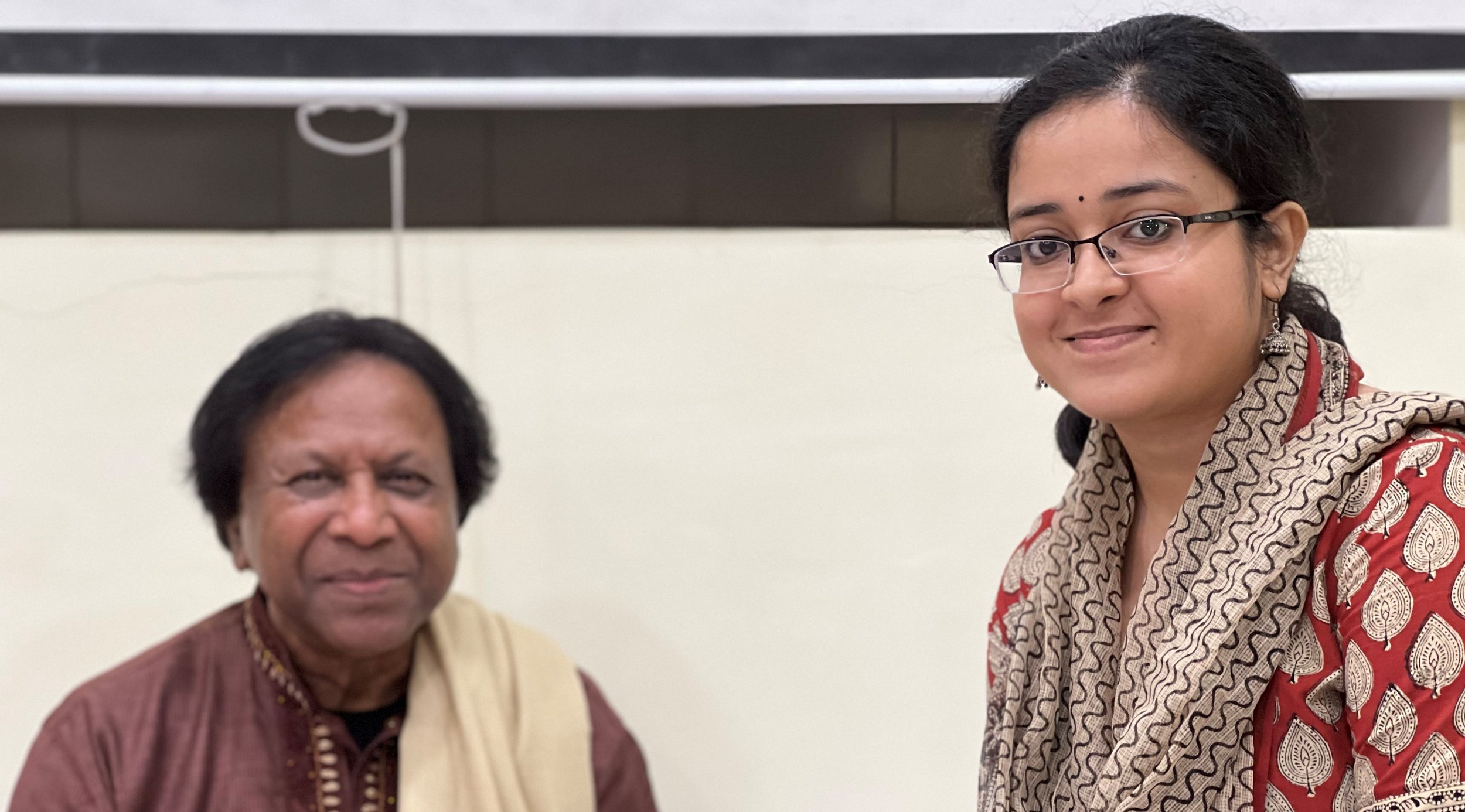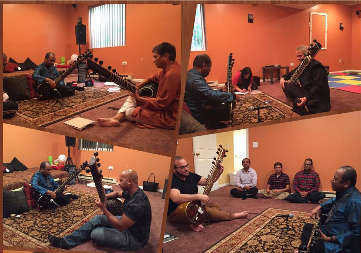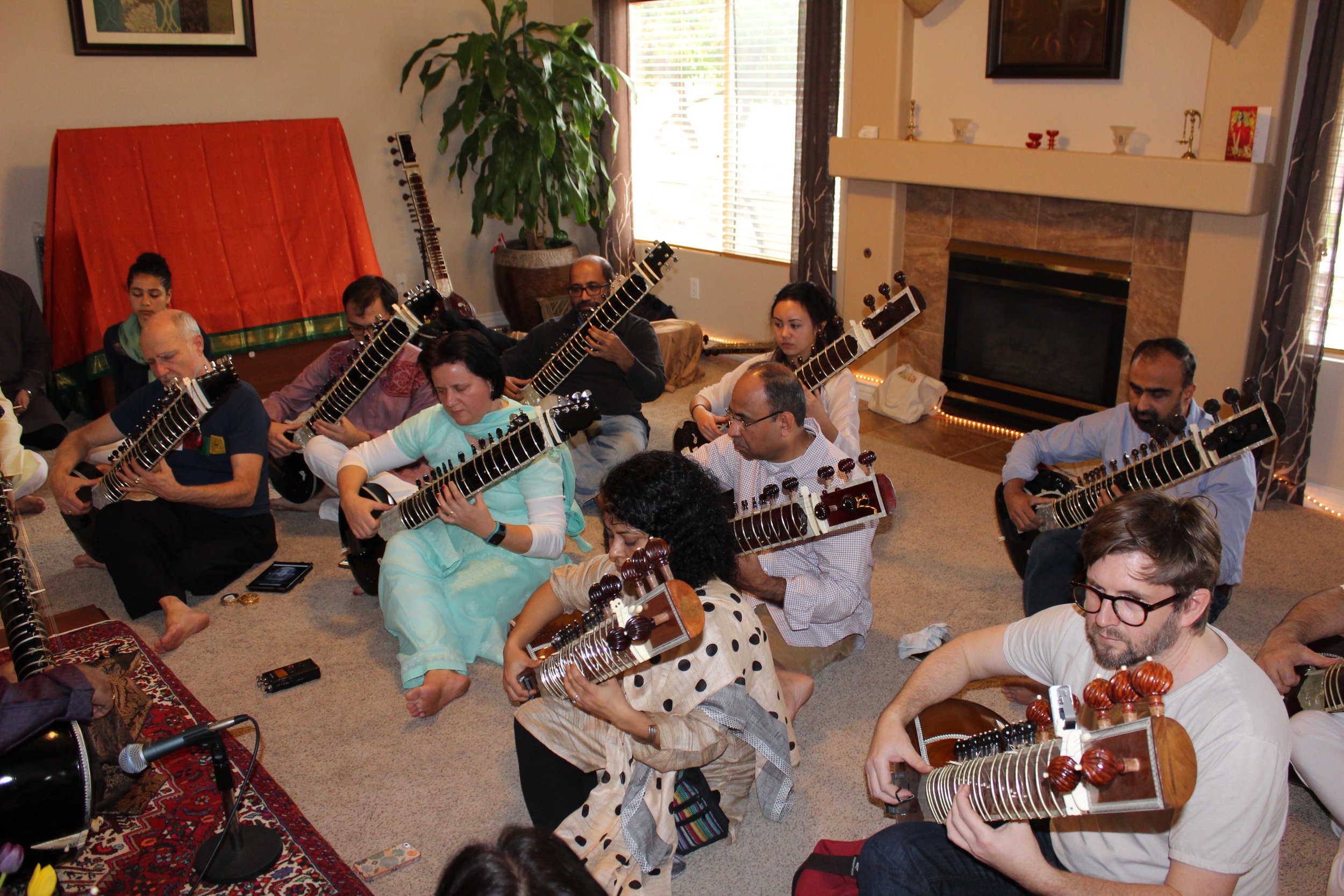The SPK Academy of Music recently celebrated Guru Purnima with Ustad Shahid Parvez Khan. Sitar students of all ages performed for their guru, showcasing their acquired knowledge and paying their respects to the sitar maestro.
Words and sentences have power.
By Subranil Sarkar for The SPK Academy of Music
Many listeners often mistakenly believe that only words and sentences (ie. the sahitya) of a composition allow a vocalist to express deeper Rasas like Karuna, Shanta-rasa, Bhakti.
It is true that words sung correctly could highlight the above-mentioned Rasas.
However, that also brings up a very important question - How are instrumentalists able to create the same impact even though their instruments do not use a spoken language to express emotions?
Pandit Kishen Maharaj had beautifully said:
““Jab koi achche Guru se shiksha praapta kartaa hain, to Tabley ko bhi jubaan aa jati hain”. ”
Translation: When a Tabla disciple receives training from a good Guru, even the Tabla speaks.
Proper tālīm and riyāz, truly, have no substitutes.
An instrumentalist has to have complete knowledge of the Raags and Taals that he/she wishes to perform, and master control over his/her instrument. But are these enough to sail through? Are these enough to elevate an instrumentalist to the level of a musician?
Many listeners (who have listened to the masters of yore) often say that the present era has been blessed with many exciting young instrumentalists and vocalists who have beautiful touches and fantastic control over their instrument/vocal cords. Incredible talents each. Yet they also feel that the depth and the subtlety are lacking in their playing/singing. But do only listeners feel so?
Ustad Vilayat Khan, himself, had once said:
““Aaj ka sangeet humein kahan le ja raha hain? Ek woh din ka sangeet tha.. jo hum aankh bandh karte thhe aur kaan se dekhte thhe.. aaj ka sangeet .. hum kaan bandh karte hain aur aankh se sunte hain” ”
Translation: Where is today’s music taking us? There were days when we would close our eyes and watch music through our ears; now we close our ears and listen to music through our eyes.
I have personally heard an anecdote from Pandit Kashinath Mukherjee about Ustad Bade Ghulam Ali Khan. A funny one. But an incredible one too. One day Kashinath ji said –
““Do you know what kind of presence Bade Ghulam Ali Khansahab had? What an aura he had! What an incredible vibration he carried around him! Even those who had no interest in music would fall in love with music, if they came in his presence.””
Then he told me that Khansahab had once caught a teenager (whom Khansahab knew and loved) smoking. Khansahab was in a hurry and said nothing to the kid at that time. Later that day when he met the teenager in his room, there were other people (including the teenager’s father) there. That’s when he started singing in Bhairavi – “... Mat Piyo beta ... Mat piyo” (‘Don’t smoke, son… don’t smoke’ - the word ‘peena’, which means 'drinking’, is synonymous with smoking.)
There were great rasikas in the room. Khansahab’s singing evoked pathos, joy and optimism. Everyone in the room started saying that Bhairavi could not have been more ethereally beautiful than what Khansahab had sung.
Needless to say, there is no such bandish as - “... Mat Piyo beta ... Mat piyo”. And, the sentence, itself, is too ordinary to evoke such strong Rasa in the listeners’ hearts. What happened there that day, many decades ago?
Perhaps the answer could be found in Ustad Bade Ghulam Ali Khan’s own words. Khansahab was enthralling the audience at a mehfil in the Dixon Lane (Kolkata) residence of Pandit Gyan Prakash Ghosh, where knowledgeable rasikas and musicians were in the audience, when suddenly Ustad Bade Ghulam Ali Khan stopped and said –
““ … ‘Nevar baji re’… kabhi bol hain?
Mamuli bol hotein hain.. Gharelu bol hotein hain zindegi ke..
par bandish Ustad ki jo hoti hain, woh kaam deti hain.. wah wah woh deti hain.. “ ”
Are these great lyrics? They are just words from day-to-day conversations. But the melodic ideas used in the composition by the Ustad are what bring in the applause.
It is true that words do fall short to express deeper feelings/ emotions even when the speaker/writer is articulate enough. Perhaps that is why the Sufi Hazrat Inayat Khan had said:
““What science cannot declare, art can suggest; what art suggests silently, poetry speaks aloud; but what poetry fails to explain in words, music can express. ”
“Whoever knows the mystery of vibrations indeed knows all things.””
The mystery of the vibrations is perhaps the most intriguing of all mysteries. But could the solution be found outside? Or does it need one to dive deep within oneself?
““Some time has to be set aside to look within to find the essence of music...When the sadhaka exercises his mind thus, he will find taal in his heartbeat, laya in his pulse, and music in his soul... ”
“His body then becomes the triveni sangam of taal, laya and raag” ”
Bharata Muni has explained in the Natya-Shastra that the bhāva-s (or emotions within) need to be expressed with expertise through actions. And, if done successfully, the expression of bhāva-s inspires within the hearts of the listeners an emotional response or Rasa.
Let me express the same phenomenon analogically. The tarab of a well-tuned instrument starts singing spontaneously on its own when a phrase lands on the intended Shruti precisely on the baaj string. In short, it is a transmission of vibrations - from the baaj string to the tarabs; from the musician to the listeners.
However, both need to be in tune with each other.
““The magic happens only when the artist serves with love and the listener receives with the same spirit.”
The human mind has a huge potential. If a musician delves deeper within oneself, he/she will surely come up with treasures from within. Then the musician could go beyond his/her dependence on words or literature to express deeper emotions like Karuna, Shanta-rasa, Bhakti, and others.
“Indian classical arts are meant to transform the self, as spirituality is woven into its tapestry….Music was and is an easy tool to meditate”
However, if musicians do not go for that inward journey as human beings; would their music express depth or compassion? Could words alone save them?
Sitar Tuning and Maintenance
When starting sitar, people have lots of questions about the instrument, about tuning, and especially about Indian words relating to music. Here is a short blog article on all of these things and a little more. Please note that this document is meant to be used as a reference guide, not a substitute for instruction.
A Short Conversation about Indian and Western Classical Music
Running around at shibirs one often overhears bits and pieces of interesting conversation. This time around (the January Chaiyanat – Kamod shibir) SPK tried to corral some of this conversational energy by asking a group of students to discuss what they understood to be the differences and similarities between Indian and Western Classical music.
The result was a very spirited 40-minute discussion full of different points of view and, I think, a lot of insight.
During the conversation, many of the participants prefaced their remarks with “I am not an expert, but…” and it was in a spirit of humility and mutual respect that things went down.
In what follows you will find a unique opportunity to listen in on a group of sitar players seeking better to understand their place in the delightfully multifaceted world in which all of us live and play.
Having gathered the group together after our morning session on Sunday, I asked the participants how they defined “classical” in the most general sense. Sudhir was quick to point out that the word “classical” was a western translation, and that there was no equivalent in Sanskrit or Hindi. He proposed “shastri” – a word relating to scholarship and ancient texts – as the closest thing. From there the discussion moved directly to comparisons. Thomas, a trained cellist, put forth “periodization” in Western classical music as a major difference. And although the group granted that there are no equivalents to “Baroque,” “Classical,” “Romantic,” or “Modern” in Indian music, the music nonetheless develops - as do the instruments.
Avichal then said boldly of Western Classical, “It’s all about harmony. It’s chordal.” Taking up on this idea, Jawwad noted that scales worked differently in Indian and Western music. The microtones (shrutis) that help define a raag, would not work in the counterpoint and harmony of the West. “The Western scale has to be mathematically precise for harmony, while the “re” (minor second) of Todi is not the same as the “re” of Shree.”
At this juncture, Thomas observed that Western classical music seldom departs from the written score. He also reminded everyone how western musicians seek to recreate the sound of the period in which a piece was originally composed – often using instruments constructed how they were in that earlier age. This important observation made me think, “In the West, the past is the past and must be conjured while in India the past remains in nearly every way part of the present.” Once, again this idea was “moderated” with Sudhir observing that even raag and Indian classical instruments are always changing. Is it a matter of degree?
Enter Sanjeev with his calm, considered tone: “I can define classical… what is timeless and what survives, and what people remember and cling to – that is classical.” Jay then emphasized the quality of work and originality saying, “Mozart produced things that were not there, Hayden did the same.” Sanjeev defended his point: “No matter if it is good, if it is forgotten and buried, it is not classical.” Jay answered, “I see what you’re saying, but I think classical is the FORM… ragas have rules, maybe that’s why Westerners associate it with classical music.” Good points all!
Pt. Ravi Shankar and Yehudi Menuhin - courtesy of The News Minute
In response to Jay, Kristopher spoke up for the first time, bringing in yet another important aspect of the “classical”: “It has not so much to do with the music, but [depends] on the class of people upon which the music is being played and who are listening to it.” Kristopher then mentioned African tradition as an example of the importance of community and audience in defining their particular “classicism”.
At this point, Avichal pulled the ideas together saying, “These are all elements that make up a part of it [the classical]. None of them by itself will define it.” This point was welcomed by all involved.
The conversation moved onto the idea of “universalism” in classical art forms. Jawwad presented the possibility that thinking the structures of any classical music are somehow “universal” is putting the cart before the horse. It is wide dissemination and accessibility that make up this aspect of music: “It’s just that Western music is in everywhere, it’s in the movies, in the cartoons (sic).” As for Indian classical, it was “a post-Independence export” helping make the case that “the West has science, India has culture.” Avichal then contended that before independence Indian classical music was virtually unknown – even in India – being mainly the music of the royal courts.
At this point, I mentioned something Ustadji had said over two decades ago and that I have never forgotten, namely that he had known of many classically trained Western musicians who had given it up and committed themselves fully to Indian music but did not know of a single example in the other direction. After asking why people thought this might be, Anna answered in a soulful and very personal way: “I heard Mozart every day in the cradle. Ok. This is music, but in India, it is more than that – it is very deep; it goes up to the root…. The difference between Indian classical music and Western is that it is deeper, it is spiritual… When I heard the sitar for the first time, finished, that’s it! Not interested in Western Classical music – at all.” Anna’s frankness was much appreciated and certainly spoke to the group’s “bias,” but as was characteristic of the discussion as whole voices came in to balance things out.
JJ mentioned musicians in the Western classical tradition may well have the same “convictions” about their music if you asked them (thereby inadvertently bringing up possible future panel discussions involving Western musicians!).
In direct response to my question as to why so few Indian musicians “move West” Jawwad commented, “In the West, there is a certain freedom to make your choices, there is a freedom from others which is not there in more traditional cultures.” Sudhir concurred and said, “It’s the same thing [in India and the West], it’s not like Indian music is more exalted.” JJ commented how Anna’s (and I suppose all our) “perceptions had changed” since learning sitar.
Anna then defended her position admirably saying, “If I go to Europe, I prefer to buy bread where there are seven generations of
bakers. Not because that bread is different.
It has something in it that was passed down from one generation to generation and it will always be tastier than any other bread that I eat.”
Things wound down, but many left the music room still talking about issues raised. It is my hope that these ideas will inspire all of you to think more deeply about the fantastic music we are learning and, perhaps, to share some of your ideas in response on our blog.
Thank you to all who participated. Wonderful…
Spotlight on Seema Gulati, sitarist...
Spotlight on Seema Gulati, Sitarist and Director of the SPK Academy of Music
We all know Seema Gulati to be our SPK Academy of Music Superwoman, gracefully and selflessly balancing her many roles - as a senior disciple of Ustadji, a performer, the director of the Academy, and mentor, teacher, and friend to so many students.
SPK Academy student Alpa Shah sat down to find out more about Seema’s story - how her musical journey began, the early days of SPK Academy, and her hopes and dreams for the future.
Part 1: How it started..
When did you start to learn music?
I was always drawn to music as a child. I loved Bollywood songs, and my dream voice was Lataji (the late Lata Mangeshkar)—I would listen to her songs all day, sing along, and dream of being her. But while I was exposed to music from a young age, I only started structured training when I was 15-16, first in Western classical singing, through the Royal Conservatory of Music, and then in Indian Classical Music from the Pakistani composer Sohail Rana. I also started some training in the Indian Classical dance of Kathak.
Seema Gulati, sitar performing in New York for Chhandayaan
Why did you choose sitar as the instrument of choice?
It happened gradually over time. I was exposed to some sitar music growing up—the first sitar players I saw perform were Pandit Debu Chaudhury and Ustad Nishat Khan. I remember thinking, ‘Just look at his facial expressions, he's having so much fun… I want to feel like that.’
It was only when I was learning Kathak in 1999, while studying at university, that my teacher, Vrinda Bhagwat, recommended that I attend one of Ustadji’s concerts. All I remember is being very drawn to the music and the performance, and finding it mind-boggling that one instrument could make all these sounds.
There was a workshop a few days after the event, and I thought I would try it out. Hilariously (although not at the time) I never made it to the workshop (I got lost on the way there!), but I started learning the basics from Ustadji’s senior student at the time, and that’s when it all began. I was fortunate to meet Ustadji again on a return visit to Toronto. I didn’t know where it would take me, but I knew that I wanted to keep playing.
What kept you motivated during those early days?
I was blessed with a certain discipline to practice. If I was told to practice sargam, I did. I knew I wanted to pursue music in some way, and so I just did it, without expectation. I knew I had started a journey, but I didn't know what the journey was.
What drew you to Ustadji?
Initially, I don’t think he recognized how determined I was, and my stubborn personality meant that I took this as a challenge. I think Ustadji was surprised to see that I was still in riyaaz each time he came back to Canada.
In 2003, I followed his concert tour, accompanying him as much as I could on tanpura, and this helped me to connect to the music and to Ustadji as an artist.
Immersing myself in the music in this way started to change the way I connected to it – I still didn’t understand it all that well, but I started to feel it, how certain notes and phrases would affect me.
That’s when I knew I wanted to continue learning Ustadji’s music. Over the next couple of years, I started to learn more frequently from him, and in 2005 I made the decision to ask him if I could become his shagird.
What did you play at your Shagirdi ceremony?
I played Raag Bihag in Teental. It was a very special composition that he had performed at the Saptak Festival, and I had heard it on his CD. (You can listen to Ustadji’s recording here).
Part 2: The birth and evolution of SPK Academy
When was SPK Academy established?
We officially established SPK Academy in 2012. It all came about very organically. During Ustadji’s concert tours, we would often receive inquiries about whether he was willing to teach, and would spontaneously organize workshops. I still recall the first workshop being held in Albany in 2006.
Upon Ustadji’s return to India students often felt lost and without direction, and that’s when he asked me to help guide them in his absence. Gradually our student numbers multiplied, by word of mouth largely. Still, these sessions were largely unstructured and spontaneous until the SPK Academy of Music’s establishment in 2012.
Over the last 10 years, more and more students have come to the academy, and we now have over 100 students. Looking back, the organic way in which it came about reflects the beauty of the process. No one was planning that I would teach or become his senior disciple. It all just gradually happened.
A number of students have also mentioned that my Western upbringing and my knowledge of Western music has helped to build a bridge between the East and West and allowed students from Western cultures to feel comfortable learning at the Academy. It brings me great happiness to know that I have been instrumental (pun intended!) in enabling access to Ustadji for a wider group of aspiring students.
How is teaching conducted at SPK Academy?
We honor the traditional way of learning, the guru-shishya parampara, and through 3-4 day shibirs or retreats, students are able to live at the academy with Ustadji and their fellow students. We host at least two shibirs a year, one on the East Coast and the West Coast. This quality time and proximity to Ustadji allows students to develop a personal connection with their guru, and to nurture and build deep life-long relationships among the student community.
We also offer one-to-one classes with Ustadji, both online and in-person, to allow students to have individual attention. And not only do we offer tutelage at the academy’s headquarters in Phoenix, but also at locations all over North America. We have held workshops in Boston, New York, Virginia, San Francisco, Pittsburgh, Ottawa, Toronto, and countless other cities.
The teaching continues all year-round. When Ustadji is in North America, we are constantly immersed in his music. When he is in India, I fill that gap for SPK Academy students - I think of myself as his mail-woman, delivering his teaching, to ensure that his absence isn’t felt so drastically. He is in touch each day, composing taans and singing them to me on the phone. This way I’m always connected to his latest soch (or “manner of thinking”) and can pass that on to the students. It’s as close as we can get to the traditional way of teaching.
How has the academy evolved since it first started?
Our most recent achievement is that in November 2021, we obtained the status of a US non-profit organization, which will enable us to pursue a new set of charitable goals. The aim is to help the under-privileged, through grants and charitable donations, to those who cannot afford to reach and learn from maestros of Ustadji’s caliber, both in India and worldwide.
We receive so many videos and messages each year from people who want to learn from Ustadji, and to me, it is such a loss that they are not able to learn due to their economic circumstances. I am personally very passionate about this - my goal has always been to make Ustadji more accessible, to allow everyone to experience his teaching, and this phase of the academy’s work allows me to pursue that goal in a new way.
This year, we managed to hold a workshop in Kolkata during which new students were able to learn from Ustadji essentially for free (Kolkata Workshop - March 2022) and to sponsor a number of students from India to learn virtually from Ustadji at subsidized rates.
What do you enjoy the most about SPK Academy?
When we set up the academy, my main objective was for more students to have access to Ustadji and to his teaching. And I am happy to have played a pivotal role in achieving that. Seeing people learning and progressing brings me such joy, and I know it brings Ustadji joy too.
Nowadays, I am enjoying seeing all the students improving in their technical ability, as well as in their ability to perform. Our mission statement is to make people musicians or performers in their own right. Ustadji believes that each of us has the ability to perform. We are gradually instilling this belief in our students, through student performances, raag challenges, and other activities that we are nurturing at the academy. I am enjoying seeing our students emerge as performers, with their own musical personalities.
A unique aspect of Ustadji’s teaching is that he teaches us the same compositions and patterns that he performs in concert, adapted to a particular student’s ability. In doing so he helps us to believe that we can perform ourselves, and listening to him perform compositions that he has taught us is simply magical and reminds us how much we want to play.
Part 3: A performer’s journey
What are your goals as a performer?
Honestly, I didn’t know I wanted to be a performer when I started. Now it is much more clear to me that this is my vision. I also see how Ustadji is grooming me and paving the way for me to perform. He has introduced me to the music, allowed me to understand it, and has instilled a desire in me to want to perform, and a belief that I am able to perform.
Your guru is always able to see your potential, to tell you where you can go and what you are capable of doing. It is Ustadji’s music and compassion that are pushing me forward on this path, and bringing out what I am capable of as a performer - I feel like there’s no stopping now, I just want to keep going and working for it.
My dreams as a performer are simply to play and represent my ustad, for people to hear me play and see his music through me. My love, passion, respect for the music and for him - that’s what I want to come out when I'm playing. And when I perform, I want to get to the state where I forget I'm performing, and just be one with whatever I am playing. That is the most important thing, to be on stage and enjoy yourself.
And you are already well on your way! Where have you been performing lately?
This year, there have been a number of special performances. In June, I played at the Indian Consulate in New York, together with a Western violinist - this was the first time in which I had collaborated with a western musician. I also was honored to perform solo at a concert hosted by Chhandayan, a highly reputable organization in New York city. Ustadji was able to attend this concert, which made it extra special.
In July, I performed at our annual Guru Purnima celebrations, held this year in Phoenix, and in August, I performed at the Silk Road Global Musicians workshop, which took place at the New England Conservatory in Boston. This was an exciting yet humbling experience, collaborating with so many musicians from around the world.
Seema with her Silkroad Practice Group
Seema with her performing group at Silkroad Global Workshop
Seema Performs at East Meets West
Most recently, I recorded an interview and short performance piece for the Musical Instrument Museum (MIM) in Phoenix as a part of their “Treasures of the Past” series. It will be showcased as part of their display of instruments from the subcontinent as well as in their monthly newsletter to all MIM members.
How do you separate yourself as the student, from the instructor, from the director to being a performer in your own right?
It’s not easy - I try to separate these roles to some degree and am constantly working on this, as well as devoting more space to developing myself as a performer. Being the director of SPK Academy is a full-time job in itself. It might compromise my development as a performer to some degree, but it is also a huge blessing to be constantly connected to Ustadji and the music. I am living and breathing music, and I am constantly inspired and motivated to be a better person and musician as a result.
What is your message for other aspiring female musicians and music students?
I think it is important not to feel that there are any restrictions. I have drawn inspiration from seeing other female musicians—Kaushiki Chakraborthy, Anoushka Shankar, Anupama Bhagwat, Roopa Panesar—all showing that it is possible to be a professional musician in their own right without compromising on their family life. If you have the desire, dedication, and the right guru, it is possible.
And even for those who don’t make it a career, it is still possible to find balance and support each other to reach whatever goals we have from learning music. The female students of SPK Academy, who are of all ages, occupations, and backgrounds, are a constant source of inspiration for me.
What are the main lessons you have learned as you have grown as a performer?
When we hear Ustadji perform, we hear perfection. And for many of us, in our minds, that’s what a performer needs to be. I have come to a realization that when we play Ustadji’s music, we play it with our own voice and that deserves to be heard. And not only must we play it, but we have to feel it. Otherwise, you are not representing the music, you're just reciting his words. You have to understand this concept when performing.
What has music taught you about life?
Music is life's biggest blessing. Nothing else gets you closer to fully understanding yourself. Ustadji always says whatever you are feeling, that is what your music is expressing. If I am feeling joy, my music is joyous. Playing is almost like sitting in front of a mirror—it has helped me become better acquainted with myself, who I am, what I want from life, and my aspirations. It has made me the person I am today. In life, we have to find our voice, and music helps us find our voice.
What is your favorite raag?
All of them are beautiful. Whatever I hear Ustadji play I fall in love with, but Raag Yaman is an all-time favorite.
Who are your musical inspirations?
Ustadji. Aside from him, all of my knowledge of music is driven by Ustadji. We have huge respect and admiration for the music of Ustad Vilayat Khan, Ustad Bade Ghulam Ali Khan, and Ustad Amir Khan, and for what they have been able to inspire Ustadji to do. I am also personally very fond of Ustad Amjad Ali Khan’s music.
What is your message to SPK Academy students?
To SPK students, actually all students of music - do it! Embrace the music and do it! That is the hardest part of being a musician, believing in the music, in the journey, in your guru/Ustad. It’s not as easy as going and getting a degree, finding a job, and starting a 9 to 5. It’s something you have to surrender yourself to and immerse yourself in. It’s easy to say but to actually do, it’s so difficult. It’s so easy to get swayed, discouraged, and demotivated. But don't - if you're doing it because you love it, keep doing it. Follow your heart and your heart will lead you in the right direction.
Interview conducted and written up by Alpa Shah, SPK Academy Student
On tour with Ustadji ...
SPK student Alpa Shah joined Ustadji and Seema for Ustadji’s (Ustad Shahid Parvez Khan) recent concert tour in the United Kingdom, her home country. Here we share some of her musings and observations from the tour experience.
Wednesday, July 6: ¡Vamos!
Ustadji and Seema arrive in London. It’s the start of the long-awaited tour to the UK, with concerts in Birmingham, Southampton, London, and Bristol, all in the space of 5 days.
We open Ustadji’s instrument flight case to do the all-important sitar check, breathing a collective sigh of relief when we see that the sitar has made it unscathed in and out of the luggage hold and through the dreaded conveyor belt.
Today is a rest day with a few phone calls to organize logistics for tomorrow’s concert. Rafael Nadal’s quarter-final Wimbledon match is on today - Ustadji is a major tennis (and Rafa) fan and the ups and downs of the match keep everyone awake and adjusting well to the time zone.
Thursday, July 7: Birmingham Bageshree
The tour bus arrives to collect us in the early afternoon. Well, it’s more like a large van rather than a bus, and with a comically oversized cargo trunk (boot), in which we place exactly one suitcase, a backpack, and Ustadji’s sitar.
A 2.5-hour drive, one motorway service stop, and several 1950s Bollywood songs later, we arrive at the concert venue, the Midlands Arts Centre, which is located next to the famed cricket ground, Edgbaston.
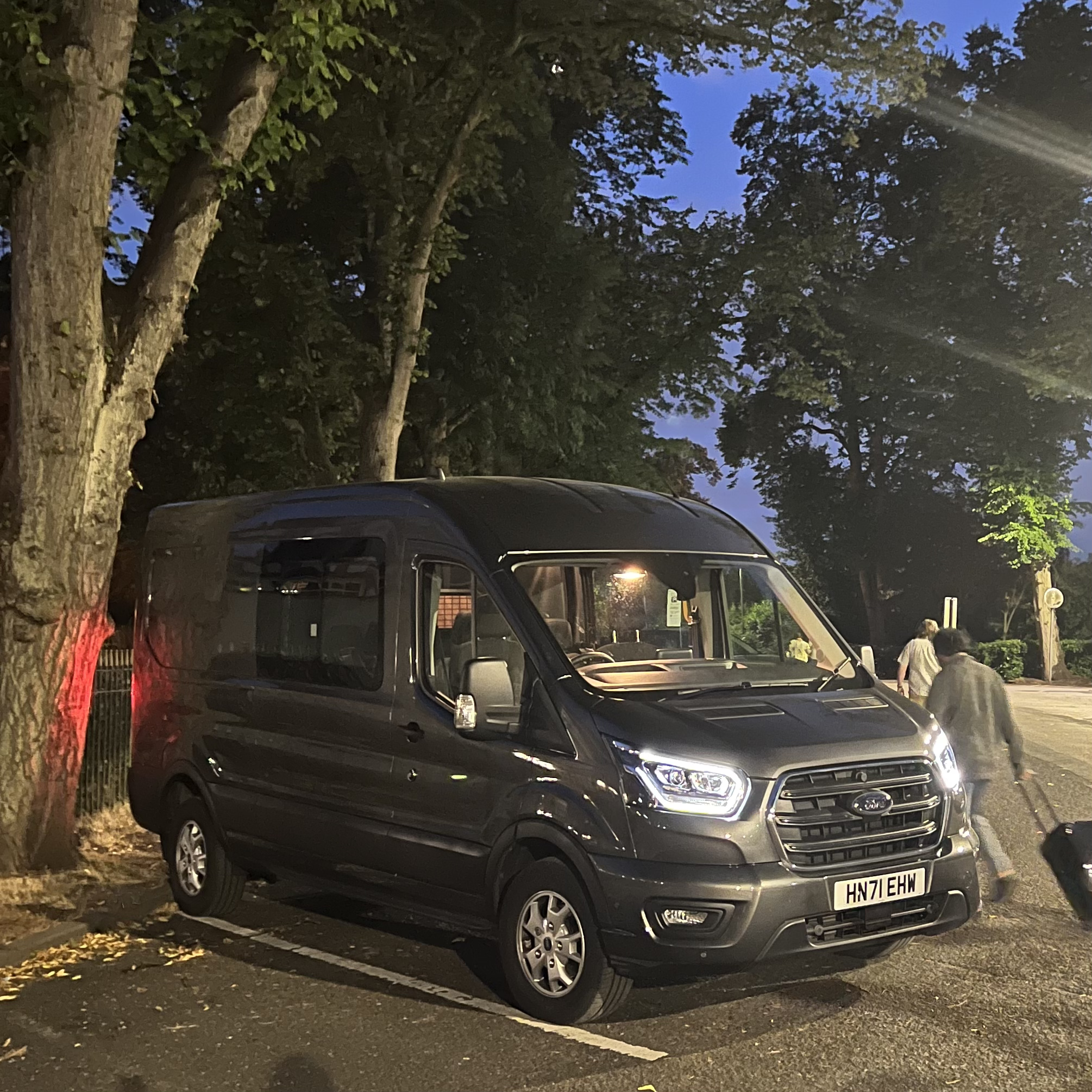
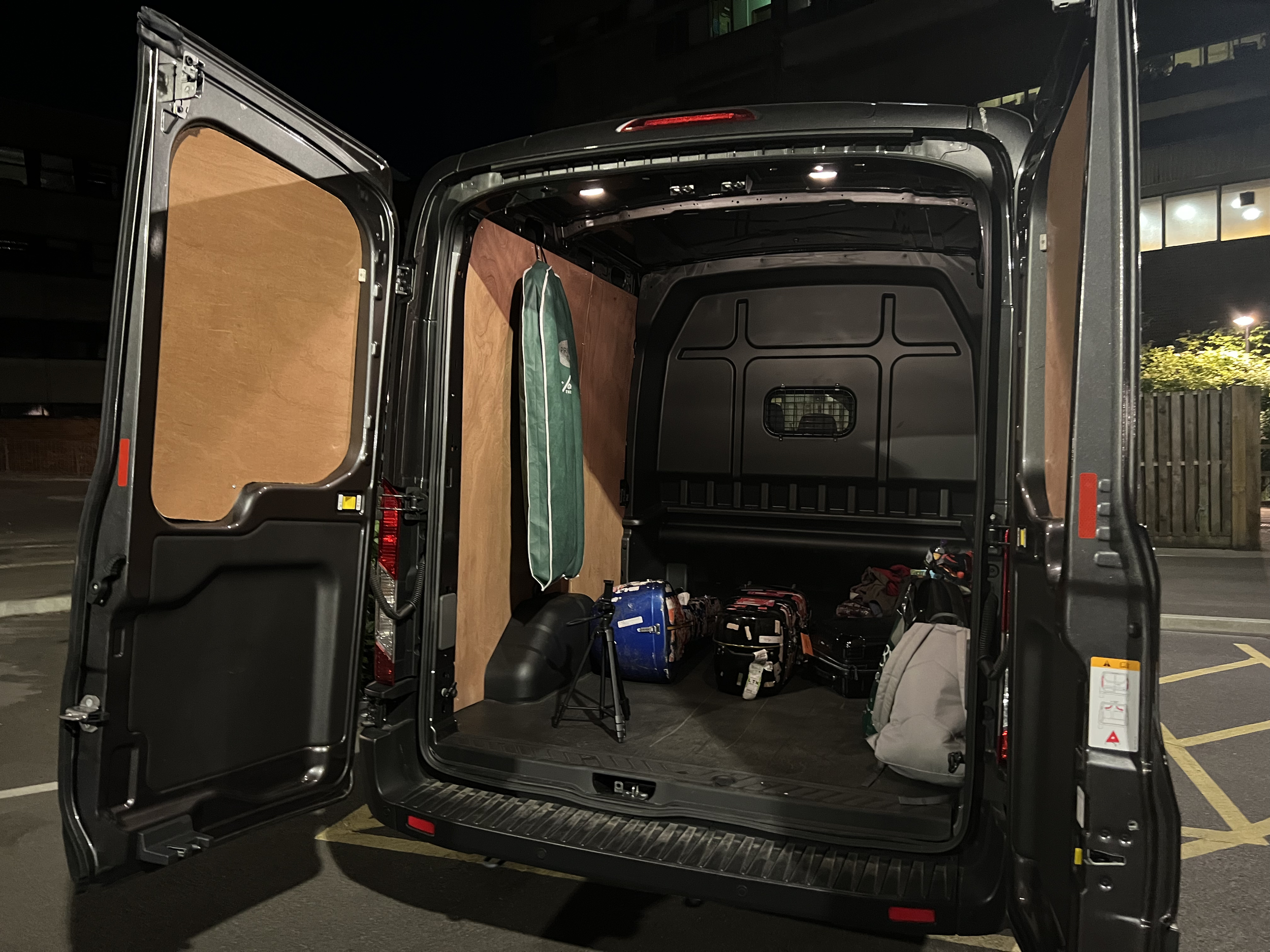
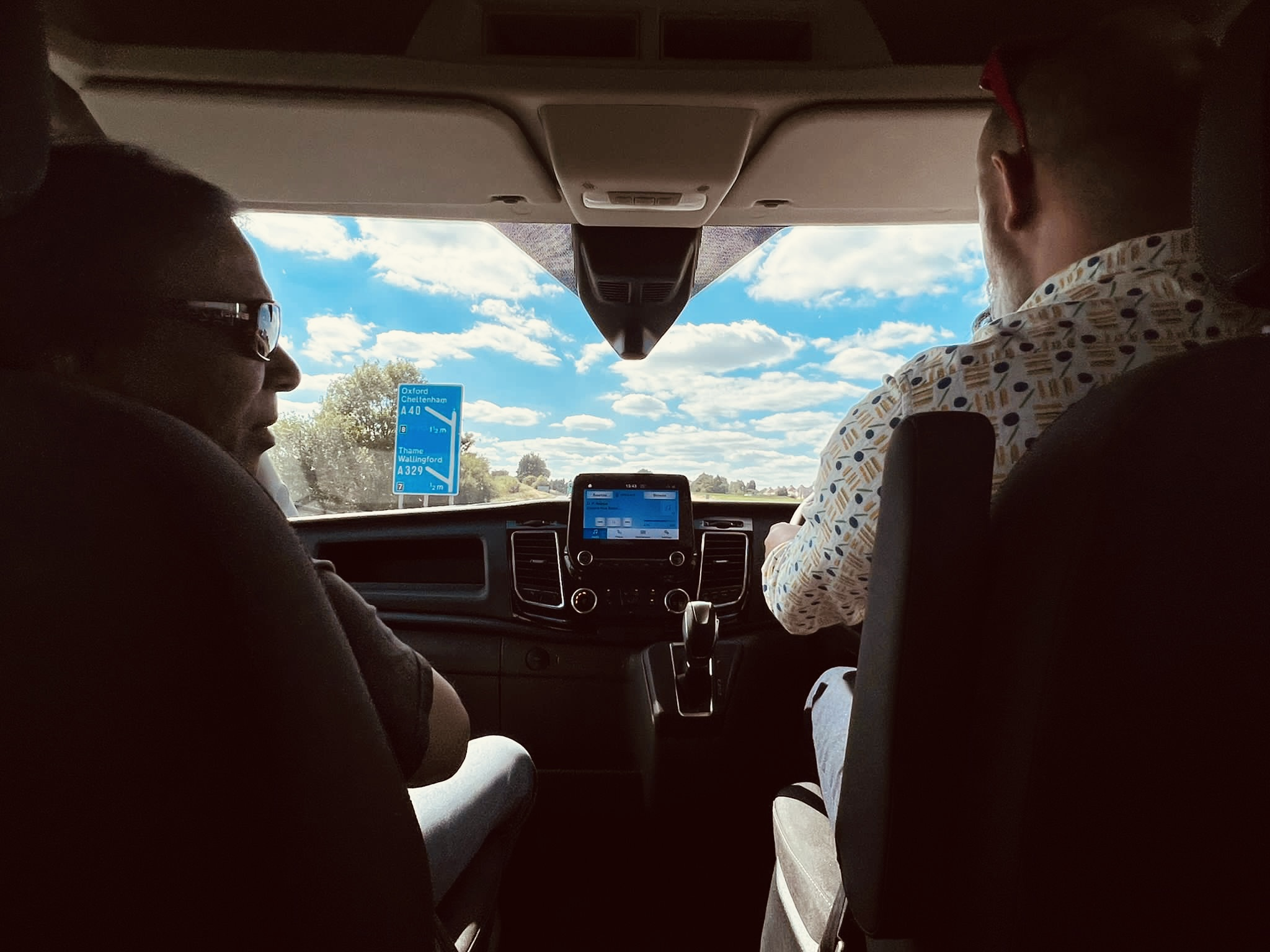
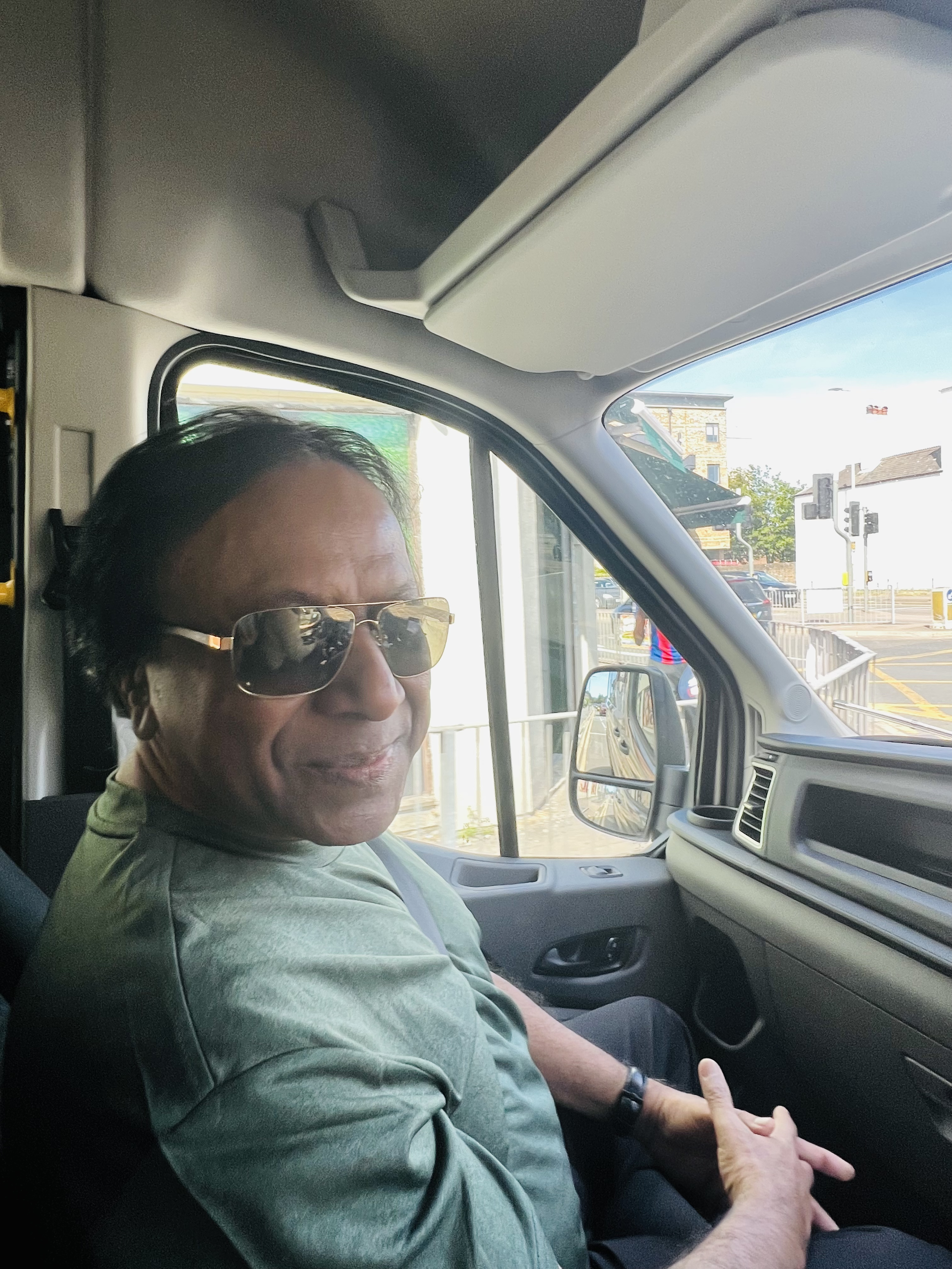
We’re cutting it a little fine, I think - it’s just an hour and a half until the concert begins, but everyone seems fairly relaxed. We enter the venue, and we are shown the dressing room where we drop off our luggage. Then, straight to the sound check, where we meet the sound technicians and the tabla accompanist, Pandit Sanju Sahai.
Sound checks, as I learn during the tour, are long and sometimes tedious processes requiring an immense amount of patience and attention to detail. At each venue, Ustadji takes the time to meet the sound team and talk them through the adjustments he is looking for. The first sound technician’s name is Adam (easy for Ustadji to remember, since it is also the name of one of his shagirds). Today, the whole process takes an unusually long time.
At some point, I stop hearing any difference in the sound, but Ustadji asks for further adjustments to make sure that the acoustics are just right.
During the sound check process, Ustadji warms up, playing alaap, gat and taans, giving us a clue as to which raag we might hear in the concert. Today our money is on Raag Bageshree. It is such a treat, our own sneak preview in an empty hall - a whole secret mini concert to ourselves.
Fellow Group Abhogi members, this one is for you :)
Sometimes he humors us, playing variations on what Seema and I have been practicing at home. This time also gives the tabla player some clues as to what he may be required to play in just under an hour, and to get prepared!
With only 20 mins to go until the concert starts, it is a rush to get stage ready (including kurta ironing!) in time to have a quick cup of tea and a snack before the show starts. This process really requires a huge degree of inner zen and confidence, I think to myself - Ustadji shows no sign of any sort of stress or panic; he is as cool as a cucumber. Then, it’s showtime!
The performance is spectacular (it is indeed Bageshree). It’s the first time I’m hearing Ustadji live in-person since 2019, and I am reminded even more strongly how uniquely and effortlessly he plays to such perfection.
The concert hall is full and the audience reacts instinctively to the performance as it unfolds, with gasps, and cries of ‘Wah wah wah’, ‘Kya baat hai’ when Ustadji pulls a crazy meend or performs clever rhythmical feats with his taans.
I also feel relieved to have finally found some British people who enjoy Indian Classical Music - they may be few and far between, but they do exist! The concert ends (as most of them do) with a standing ovation. Fans come to greet Ustadji, pay their respects and take photos.
Saturday July 9: Southampton and ‘Les Mizrab’
We return to London the next day for one night of rest, before heading to Southampton. The next three days will involve consecutive nights of concerts. While incredibly exciting, it is clear that life on tour involves an immense amount of stamina. I’m only tagging along and helping out, and even I begin to feel the slight fatigue of travel, packing, carrying luggage around, and late nights.
We arrive in Southampton in good time, and there is a fair amount of waiting around as things get set up. Pizza is ordered for the green room, and Ustadji asks about dinner arrangements. I notice that while most logistical details are left to Seema to deal with as his manager, Ustadji always weighs in on matters of food. It is well-known that musicians are typically big foodies, enjoying late-night post-concert dinners, and Ustadji is no exception.
Partly driven by his love of good desi food and partly due to the sheer amount of physical effort he is exerting during his performances, he is keen to make sure there are snacks available before the show and a hearty meal awaits afterward. Today it seems that we will need to order in for dinner, as restaurants will mostly be closed by the time the concert ends. Ustadji thoughtfully selects dishes from the menu from a local restaurant, catering to everyone’s tastes.
Interestingly, today’s audience is primarily non-Asian, and Ustadji adjusts his concert introduction a little, explaining the nature of raag and the structure of the performance (he will be playing Raag Gavati). Still, the audience interacts and expresses themselves well, clapping at key moments to show their appreciation and acknowledgment of Ustadji’s musical skill, adding to the vibrant energy in the auditorium.
Everything seems to be going smoothly. And then, as far as sitar concerts go, midway through the first half, drama strikes.
While he is playing (an insanely fast) jhalla, Ustadji’s mizrab breaks, bringing the performance to a halt. Uh-oh!
And there are no mizrabs hooked onto the tarab pegs ready to use. Now what? Definitely a situation that would cause a spike in blood pressure for most SPK Academy students.
Ustadji calmly puts down the sitar, and looks in his sitar pouch for a new one, instructing Sanjuji to carry on the show for a minute with a tabla solo. It takes him a moment to find a replacement mizrab, but still no sign of any sweat or stress from Ustadji.
And even though we can tell that the new mizrab does not fit optimally, the concert goes on. During the intermission, a more suitable mizrab is located for the second half. Phew!
Sunday, July 10: London Calling
Time for the concert we (or rather I, being a Londoner) have been waiting for, at the new and prestigious King’s Place! We head to London from Southampton in the morning and onto the concert venue in the afternoon after a quick lunch.
As we enter King’s Place, there is a large digital poster of Ustadji displayed above the main reception. The venue staff members are clearly excited to see him walk through the doors, instantly recognizing him. It feels quite fun to be a part of the ‘celebrity crew’.
“We’re with the artist”, Seema and I say, as we navigate our way around the security-controlled backstage area.
The venue is new and very polished, and the sound check is smooth, giving Ustadji time for a much-needed nap in the green room, having been on the road much of the day.
During the first half of the concert (today it’s Raag Rageshree), Seema and I sit in the concert hall's balcony rather than in the front row, to try and get a variety of photos and footage of the performance.
It feels strange to be so far away from the stage - one of the special things about being in the front row is the way in which Ustadji interacts with us during the performance, and sees our reactions to his music. We decide to move to the front for the second half.
The concert ends and a large crowd of fans waits in the foyer to greet Ustadji. He comes out and meets each of them, talking to them, taking countless photos, and giving many autographs. Again, I marvel at Ustadji’s stamina to do this after a two-hour performance.
After the fans leave, we are treated to a delicious dinner at a Punjabi restaurant in Covent Garden. It’s the oldest in the UK, we are told, and frequented by many well-known visitors from the subcontinent. Well, now they can add Ustadji to that list!
Monday July 11: Bristol Bravo, Bravo Bristol!
Ustadji and Seema head to Bristol the next day, and I stay home to prepare to travel to Phoenix the following morning for Guru Purnima.
That evening, as Seema sends over photos of the stunning venue (St Georges) and video clips of the concert (today is Raag Yaman), I wish I could be there. It ends with a standing ovation and calls for an encore, to which Ustadji obliges.
Another successful tour concluded. I loved the experience - it was truly special to be there behind the scenes, and a real treat to listen to three of Ustadji’s concerts in such a short space of time.
Thank you to Ustadji and Seema for letting me be part of it.
Kolkata Workshop - March 2022
Following our initial fundraising round in November 2021, the SPK Academy was able to hit the ground running in 2022 with its charitable work. The first event was a sitar workshop held in Kolkata in March 2022. SPK students Alpa Shah and Kelly Johnson sat down with Seema Gulati, SPK Academy’s director after the event to learn more.
What were the goals of the event?
Now that the SPK Academy has become a non-profit organization, we are better positioned to pursue one of our major goals for the future, namely to increase awareness of Indian Classical Music across the globe, through the teachings of Ustad Shahid Parvez Khan.
Making Ustadji and the unique resources of the Academy accessible to sitar lovers in India is a very big part of this. Starting in Ustadji’s beloved Kolkata, this first workshop provided music students in India the chance to learn music directly from him and to get acquainted with the work and teaching methods of the SPK Academy. The Academy covered Ustadji’s teaching fee in its entirety, while the students were only charged a nominal Rs 500 (US$6) registration fee to attend.
Twenty-five students of all levels came, and for many, it was truly the experience of a lifetime. Their excitement hung palpably in the air… with the music!
“Thank you so much to SPK Academy of Music for this life-changing experience of getting to learn from Ustadji! Truly grateful for this opportunity ”
Why Kolkata?
For everyone at the SPK Academy, it is very special to be able to repay in some small way the inestimable debt owed to India for sharing with us its rich classical heritage so wonderfully “packaged” in the music of Ustad Shahid Parvez Khan.
It is also important to mention that Ustadji expressly chose Kolkata for the first SPK India workshop as a city that holds a special place in his heart. Kolkata helped raise Ustadji musically in his youth and remains a major hub of Indian culture, art, and music.
What did the workshop involve?
The workshop took place over 6 hours, with students divided into groups according to their ability. Each group was in for a real musical treat, with a selection of beautiful material to learn and practice. Ustadji taught compositions and taans in three different ragas - Khamaj, Hansadhwani, and Abhogi - giving the students a feel for how teaching is conducted at the Academy.
While most students came to learn on the sitar, others came with a variety of other instruments, including guitar, sarod, and tabla. The tabla players accompanied the instrumentalists while Ustadji taught.
As he often does, Ustadji took the time to provide the tabla students with rare rhythmic compositions that are not only precious but also extremely exciting. These helped keep the energy at peak level throughout the event. Ustadji also answered student questions on musical concepts and often provided demonstrations on his sitar.
The careful attention paid to his every word showed what a rare treat it was to hear the maestro play and discuss music in such close proximity! Hopefully, it will be much less rare in the years ahead.
Students came away from the workshop excited, energized, and profoundly grateful to Ustadji, and to the Academy for helping to provide the opportunity to learn. At the workshop’s conclusion, many participants said that it was a huge blessing for them to attend and that they would not have been able to afford access to such musical training without the SPK Academy’s sponsorship.
Seema Gulati, as the Director of the Academy, expressed to us how gratifying it was to be able to make this event possible, especially after seeing just how much it meant to the students. She also felt there was a wonderful reciprocity underpinning the event. SPK Academy succeeded in sowing the seeds of musical inspiration in Kolkata, while at the same time Kolkata inspired and energized the music in a way unique to the “City of Joy.”
With one India workshop complete, what happens next?
Since the workshop, a number of students have enquired about how they can continue to learn with the Academy. In response, the Academy is now offering virtual lessons with Ustadji and US-based senior instructors at country-adjusted rates for Indian students.
The Academy will also be conducting several more workshops in other Indian cities, after which students will be able to apply for financial assistance to undertake training through the Academy. Scholarships will be awarded to promising students who can demonstrate their commitment and dedication to the music.
Where will the next workshop be?
This year’s fundraising round began with the SPK Academy’s 10-year anniversary. By February we had already received pledges of close to US$60,000!
Our goal this year is to raise US$110,000.
These funds will allow us to proceed with hosting a number of new workshops, currently planned to take place in Chandigarh, Varanasi, and Delhi. Stay tuned!
SPK Academy Has 501(c)3 Status!
Anusri Mittal
At age five Anusri attended her brother’s tabla lesson but was powerfully drawn to the melodies of sitars being played nearby. Four years later, in 2010, she found the SPK Academy and began to learn sitar in the Etawah tradition. She was nine years old. However, there was a major obstacle to overcome, as her family moved to China that summer. Thus she became the Academy’s first Skype student, waking up at 6 in the morning to accommodate the time difference. When Anusri finally got the opportunity to study with Ustadji in person at shibirs and workshops, she had yet another obstacle to overcome - her innate shyness. Once again love for the music prevailed as she traveled from her new home in Detroit to learn in Phoenix. Anusri’s progess on the instrument attests to her level of dedication. She presently lives in California.
When you started the sitar, did the influence of your parents affect your decision to learn?
It was my choice to start, but sometimes they would force me to practice. Now I’ve realized that if I want to progress, I need to practice.
Do you enjoy playing sitar?
I do enjoy it. Even if I’m doing something else, I’ll find myself playing taans in my head.
What is your favorite raag?
Yaman.
Have you been to any shibirs?
I attended a shibir many years ago and then one in Phoenix last January. It’s a very creative environment; there’s always people practicing, you can hear sitar everywhere. It’s a perfect time to just focus on sitar.
What are your plans for the future?
I’m graduating from Valencia High School next May, and plan to attend a four-year college, to major in either marketing or international relations. I also want to continue learning Chinese.
Do you have a specific musical goal?
Yes, I want to be able to play all of the pieces where I pull, and do it comfortably.
Do you have any thoughts you’d like to share about the Academy?
SPK Academy has been a great experience, and I’m very happy to have been a part of it for the last eight years. Everyone is very encouraging. And it’s such an honor to learn with Ustadji, I’m very thankful for that.
Ustadji says Anusri has all the qualities necessary to become a fine sitarist. She has shown both commitment and talent and he encourages her to follow her musical dream.
SPK Academy of Music student, Anusri performs for Ustad Shahid Parvez Khan and other SPK Academy students at a weekend-long intensive workshop/shibir.
The SPK Academy Learning Experience
Many music academies exist, but few that rigorously uphold the tradition of the guru-student relationship, or guru-shishya parampara; here at SPK Academy, this is the foremost pillar of our foundation. Though Ustadji uses a variety of more modern techniques, such as Skype, to impart his musical knowledge, the tradition itself remains intact. However, no amount of online lessons can replace the experience of in-person lessons, for it is not only material being taught, by observing the guru, how he lives apart from music, his philosophies, personality, only then can his music be more deeply understood, and ultimately, played.
It is at a shibir, a three-day music camp, where the magic happens, where for those three days, no matter how long it has been, we are instantly at home in the company of our fellow students and Ustadji.
One student writes, “...Shibirs. Weekends away from everything, when I can truly focus on my passion - music. These amazing events give me a chance to spend first hand time with those I consider family, and at the heart of it all is my guru, my Ustad.”
~Avichal Jha
To the newcomer, the first shibir can be very intimidating, but by the third or fourth, one knows what to expect, and what is expected of him or her, but even within the usual shibir schedule, it is really Ustadji’s mood that dictates the flow of the shibir. It is not an easy art, but like all difficult things, every minute of hard work and practice is rewarded in the end. Whether you are simply curious or wish to pursue music seriously, a shibir is the place to experience Ustadji’s music in all its brilliance; it is the place to discover and or deepen musical love.
Workshops provide a shibir-like environment that is accommodating to those who cannot attend shibirs, due to busy work schedules, as well as a supplement to keep students on track as shibirs are usually spaced several months apart. At workshops, students can receive undivided attention from Ustadji (Ustad Shahid Parvez Khan)
Skype lessons with Ustadji offer musical training to students who are travelling or unable to attend workshops or shibirs, and are an invaluable tool we can use to stay connected to music.
Senior students Gagandeep and Jay shared their thoughts on Skype lessons.
“I would describe Skype lessons with Ustad ji as a great medium of instruction. It's as real as it can get to replicate a one on one in-person experience of learning from Ustadji. What I like most about Skype classes is that the content of class is tailor-made to suit your individual learning needs. It's Ustadji speciality to come down to the level of the learner, irrespective of his/her proficiency level or command of the instrument.”
~Gagandeep Singh
“It provides priceless one on one time with Ustadji, something that can be very difficult to obtain during a large shibir or group workshop. When the Shagirds get together, we always ask each other, "Have you had any Skype lessons? What are you working on?”
~Jay Matrona
Each mode of learning offers something unique, but the combination of shibirs, workshops, and Skype lessons fulfills all of a student’s musical needs, making for a complete learning experience.





